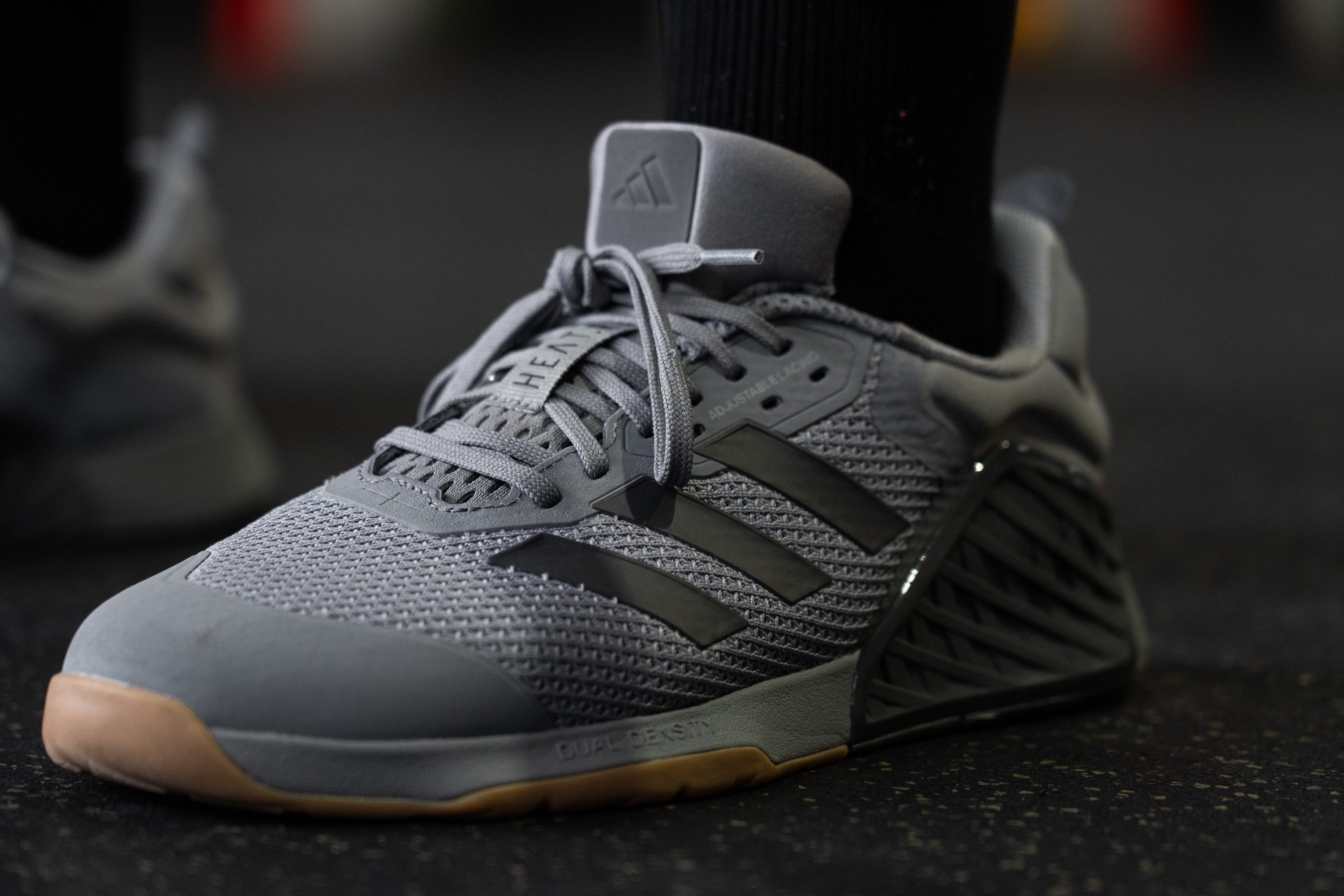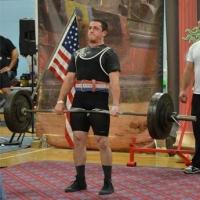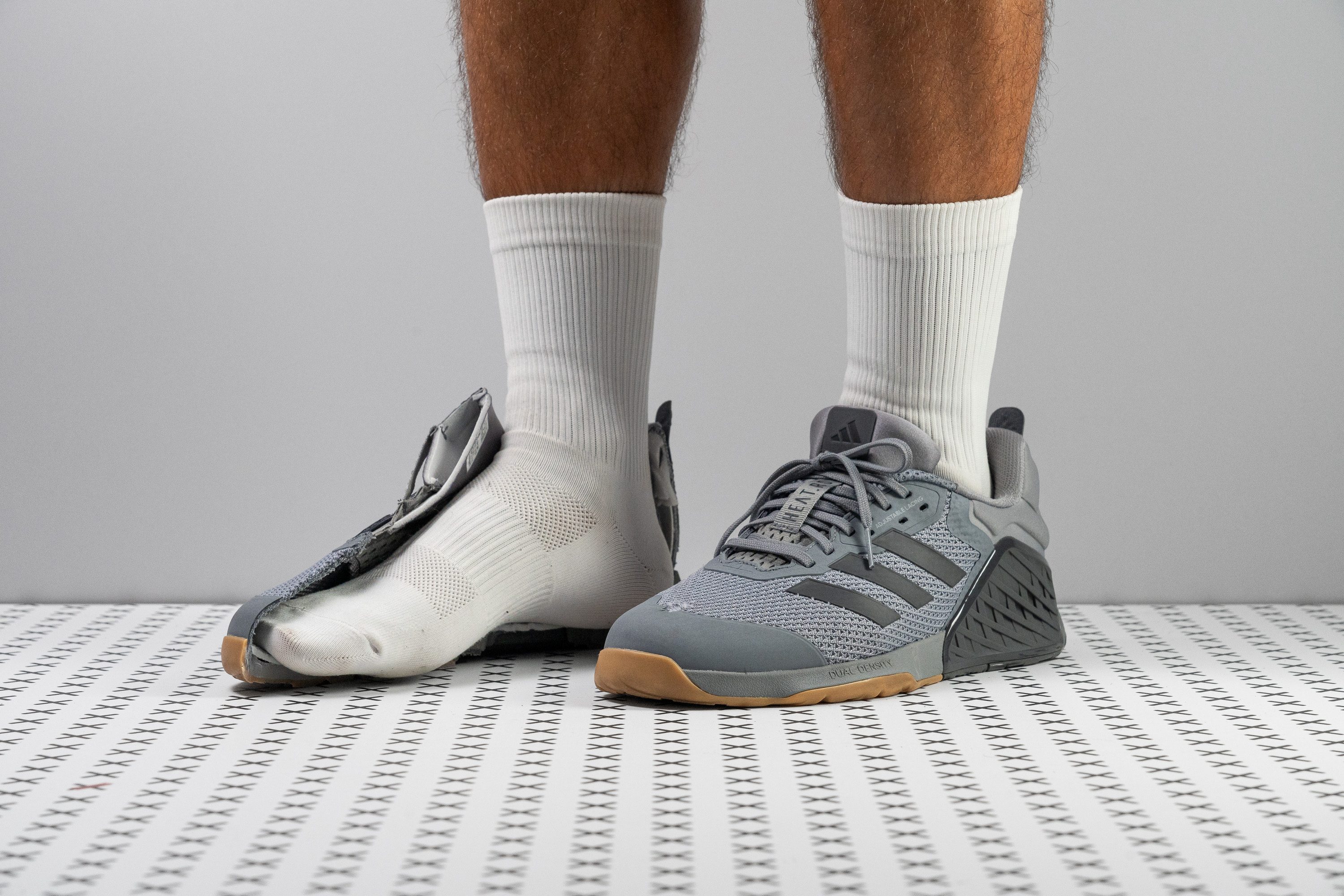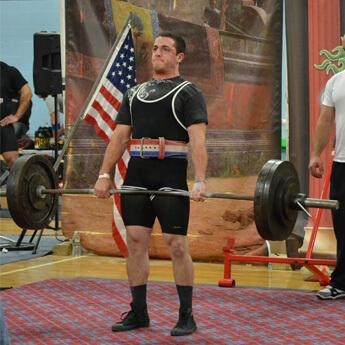Our verdict
- Top pick in best weightlifting shoes
- Top pick in best workout shoes
Pros
- Exceptional stability for lifting and lateral movements
- Very wide and grounded platform
- Extra durable and grippy outsole
- Very secure foothold
- Flexible enough for plyometrics
- Fantastic breathability
- Accommodating toebox
Cons
- Not great for running and walking (clunky heel)
- Can't be worn outside because of sole apertures
Audience verdict
- Top 25% in training shoes
- Top 25% in training shoes for wide feet
- Top 22% most popular training shoes
Comparison
The most similar training shoes compared
+ + Add a shoe | |||||
|---|---|---|---|---|---|
| Audience score | 90 Great! | 82 Good! | 78 Good! | 82 Good! | |
| Price | £110 | £150 | £140 | £150 | |
| Use | CrossfitWorkoutCross-trainingGymHIIT | CrossfitWorkoutCross-trainingGymHIITAll sports | CrossfitWorkoutCross-trainingGym | CrossfitWorkoutCross-trainingGymHIITSkipping rope | |
| Shock absorption | Low | Moderate | Moderate | Low | |
| Energy return | Low | High | Moderate | High | |
| Traction | Moderate | High | High | Moderate | |
| Drop lab | 7.8 mm | 7.9 mm | 9.1 mm | 7.7 mm | |
| Heel stack lab | 22.6 mm | 25.6 mm | 27.7 mm | 22.9 mm | |
| Forefoot | 14.8 mm | 17.7 mm | 18.6 mm | 15.2 mm | |
| Weight lab | 12.1 oz / 343g | 12.5 oz / 353g | 12.1 oz / 344g | 12.1 oz / 342g | |
| Breathability | Breathable | Warm | Breathable | Breathable | |
| Width / fit | Medium | Narrow | Wide | Medium | |
| Toebox width | Medium | Wide | Wide | Medium | |
| Size | True to size | True to size | Half size small | True to size | |
| Midsole softness | Firm | Balanced | Firm | Balanced | |
| Stiffness | Moderate | Moderate | Moderate | Moderate | |
| Torsional rigidity | Moderate | Moderate | Stiff | Flexible | |
| Heel counter stiffness | Moderate | Moderate | Flexible | Moderate | |
| Toebox durability | Decent | Good | Bad | Bad | |
| Heel padding durability | Good | Good | Bad | Decent | |
| Outsole durability | Good | Decent | Decent | - | |
| Midsole width - forefoot | Very wide | Average | Average | Average | |
| Midsole width - heel | Average | Average | Average | Average | |
| Widths available | NormalWide | Normal | NormalWide | Normal | |
| Insole thickness | Average | Average | Very thick | ||
| Outsole thickness | Average | Average | Average | Thick | |
| Outsole hardness | Average | Hard | Average | Average | |
| Heel tab | Pull tab | Finger loop | None | None | |
| Tongue: gusset type | Both sides (full) | None | Both sides (full) | Both sides (full) | |
| Tongue padding | Average | Average | Average | Very thin | |
| Ranking | #9 Top 25% | #29 Bottom 21% | #31 Bottom 16% | #28 Bottom 24% | |
| Popularity | #8 Top 22% | #33 Bottom 10% | #31 Bottom 16% | #21 Bottom 43% |
Who should buy
Don't ignore the Adidas Dropset 3 if you are looking for the following:
- a super stable cross-trainer for weightlifting and Crossfit
- a gym shoe with exceptional breathability
- lots of toebox space for toe splay, swelling, and wide feet
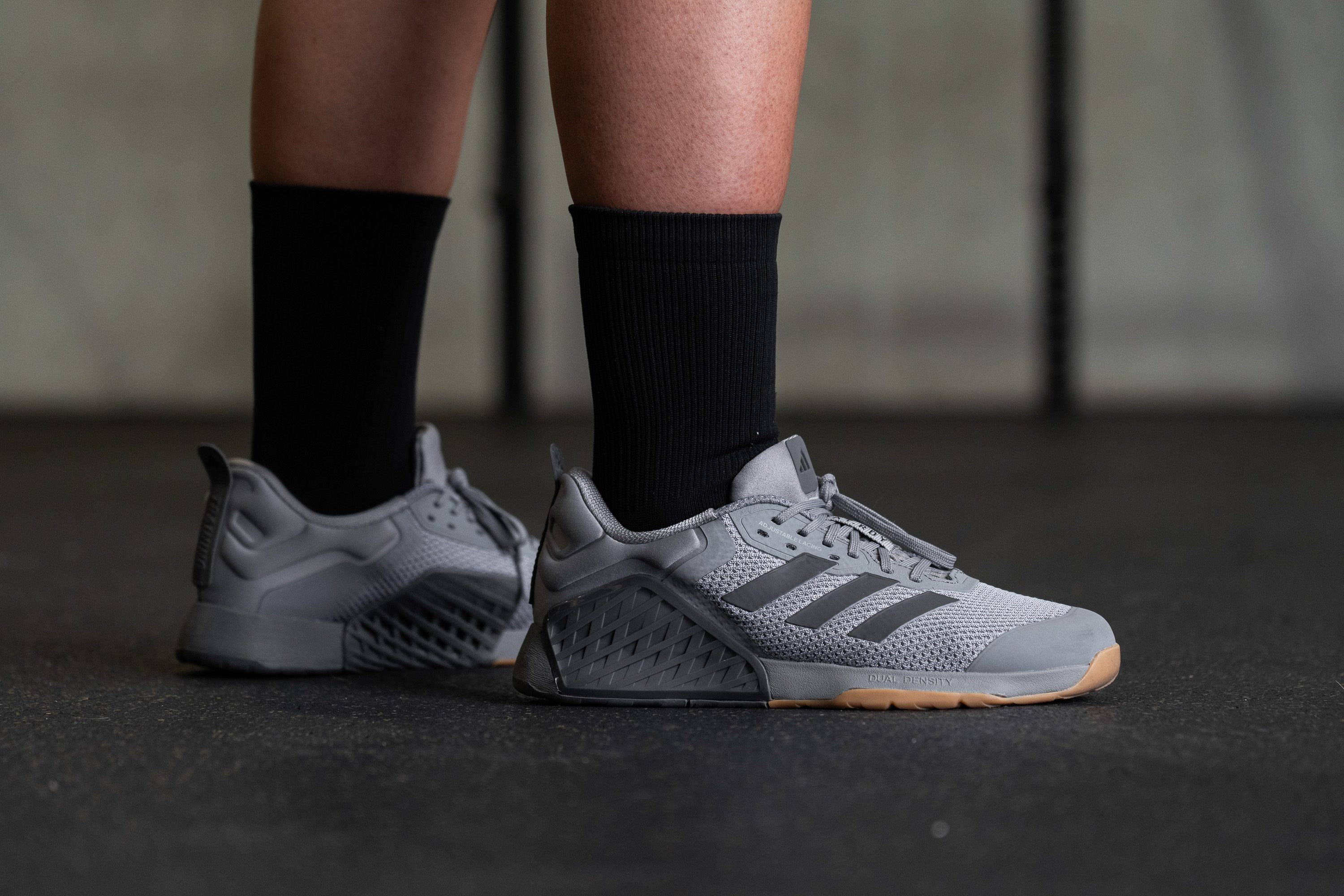
Who should NOT buy
We found that the Adidas Dropset 3 is more biased toward stability and lifting which makes it less versatile for other types of exercise.
If you want a more well-rounded option for HIIT, we strongly recommend the Nike Free Mecton 6 or the Reebok Nano X4 instead. The Nike Air Zoom TR 1 is a great option too if you want a boost of cushioning and Zoom Air responsiveness for cardio.
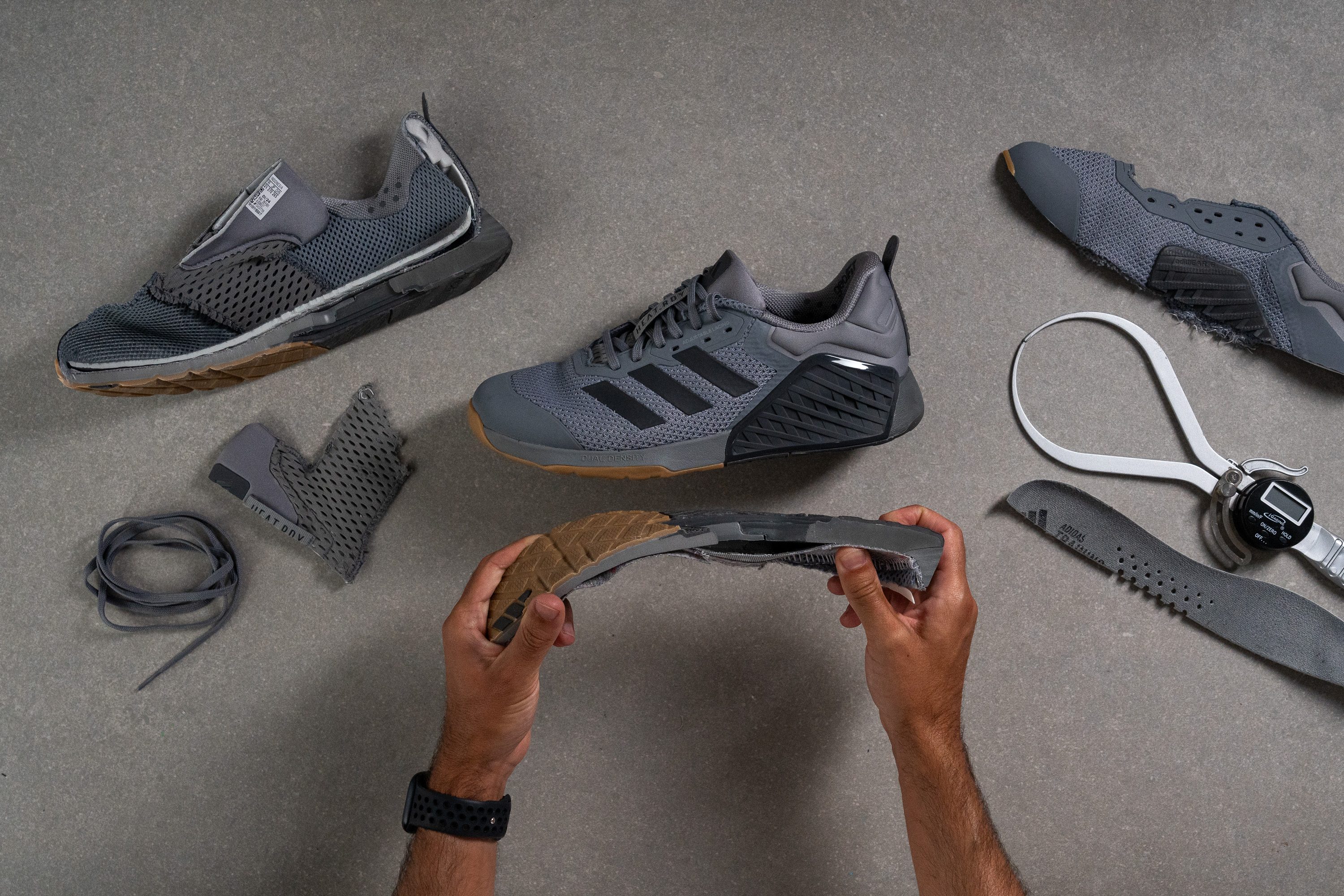
Cushioning
Shock absorption
The Dropset 3's focus on weightlifting is evident in its very low shock absorption measurements in both the heel (73 SA) and the forefoot (54 SA).
Offering so little impact protection, this Adidas shoe is clearly not the most jumping-friendly in our catalogue.
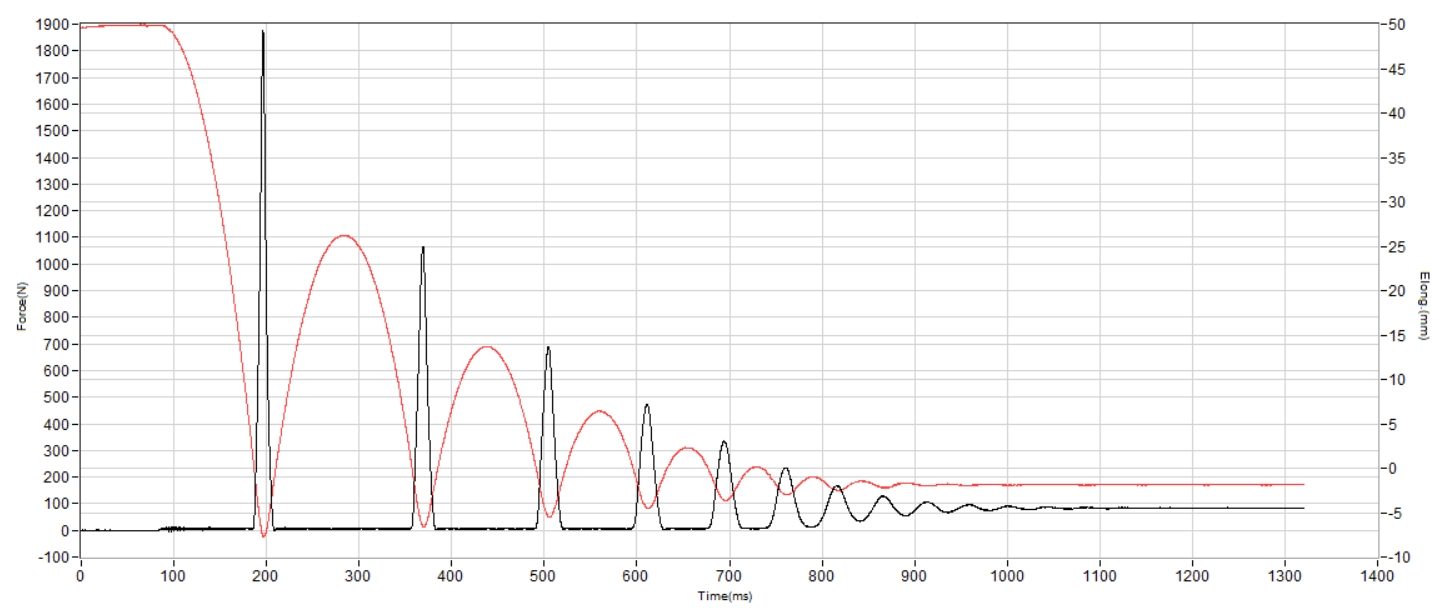
| Dropset 3 | 73 SA |
| Average | 79 SA |
Energy return
The shoe's stable and sturdy heel translates into a moderate energy return of 48.9%. You can expect a static and planted experience here to accommodate your surefooted lifting sessions.
The forefoot, on the other hand, turned out to be more responsive and dynamic at 56.8%. It adds some pep to the toe-offs, making the shoe more agreeable for some plyometric work on your toes.
| Dropset 3 | 48.9% |
| Average | 54.8% |
Heel stack
The Dropset 3's oversized side panels can make it seem tall and platformy but in reality, it is even more grounded than average.
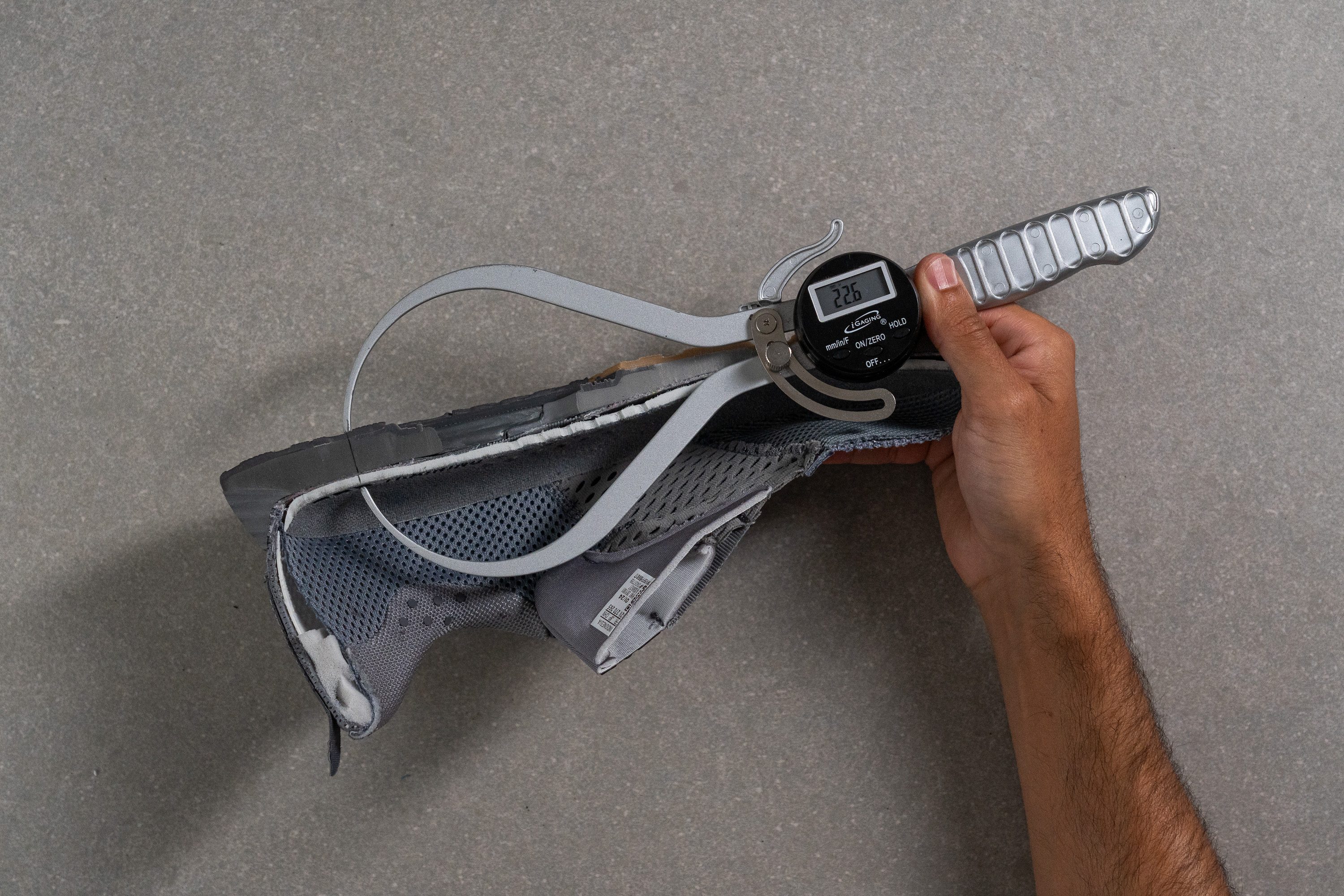
Using a calliper, we measured the shoe's heel stack at 22.6 mm which is a couple of millimetres lower than average.
| Dropset 3 | 22.6 mm |
| Average | 24.3 mm |
Forefoot stack
The forefoot stack turned out to be even lower at 14.8 mm. This made the ground feel more prominent in the Dropset 3 and made its forefoot more flexible as well.
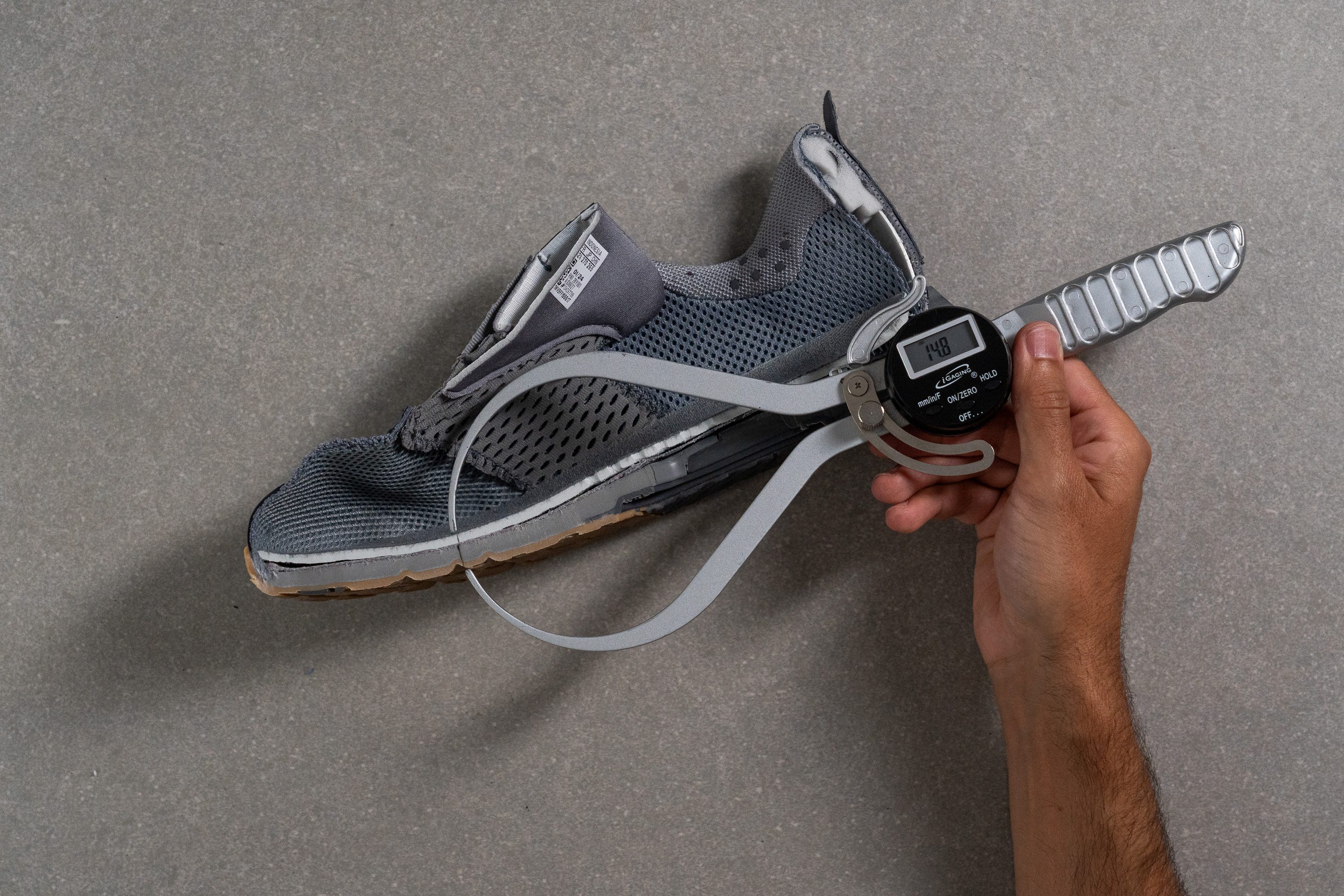
| Dropset 3 | 14.8 mm |
| Average | 18.1 mm |
Drop
The difference in stack heights resulted in a heel-to-toe drop of 7.8 mm which is a bit taller than the stated 6 mm.
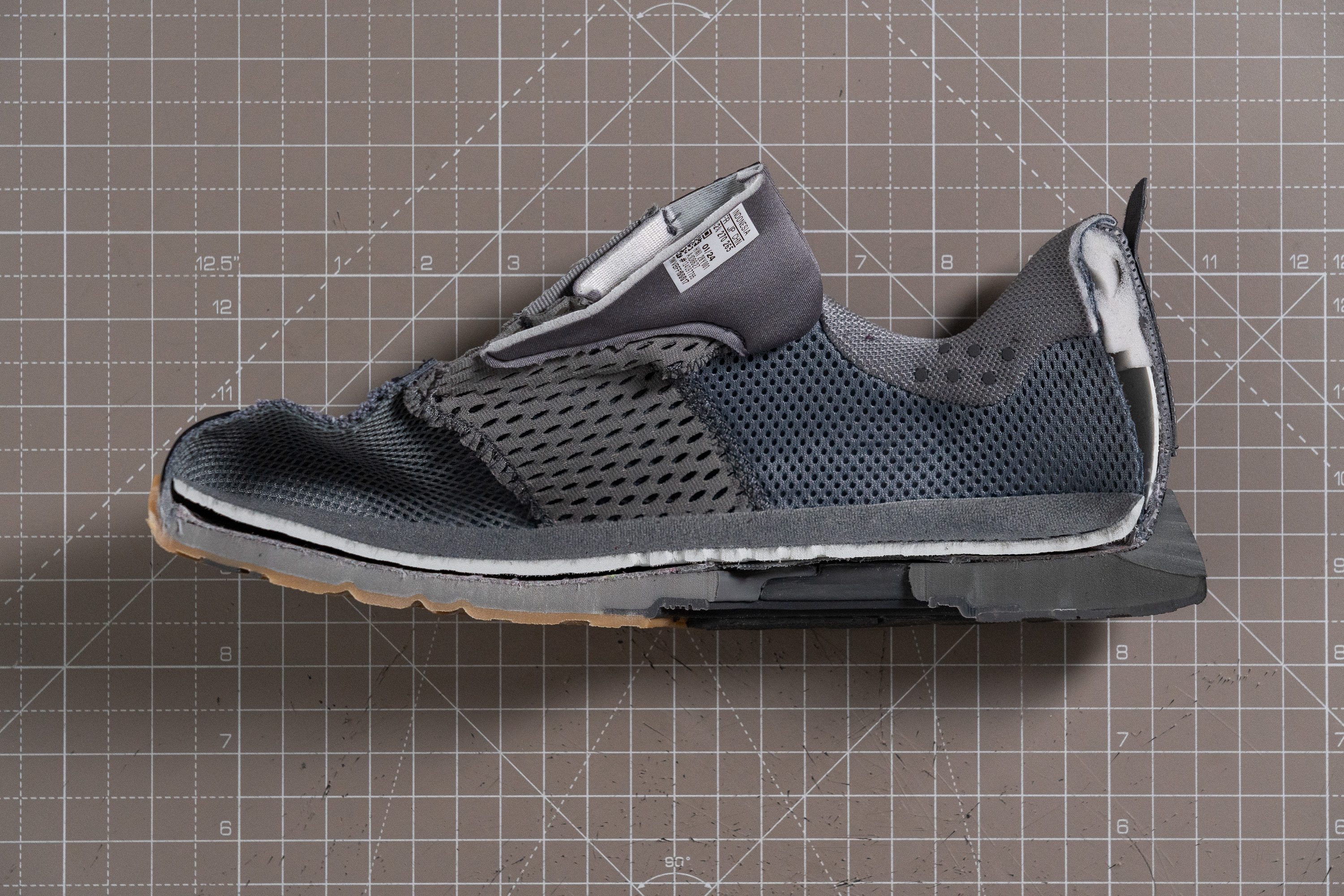
Personally, we didn't experience any issues with this discrepancy. We never felt as if the heel was too high off the ground because this Adidas trainer has so many grounding and stabilising components in its design.
But we must point this out in case you are after a pure low drop in a training shoe.
| Dropset 3 | 7.8 mm |
| Average | 6.3 mm |
Midsole softness
Just like the Dropset 2, the third iteration employs a dual-density midsole to create a balance of stability and cushioning.
Measuring the firmer portion in the midsole, we got 41.0 HA on our Shore A durometer. This is indeed very firm considering that the average training shoe foam is 50% softer.
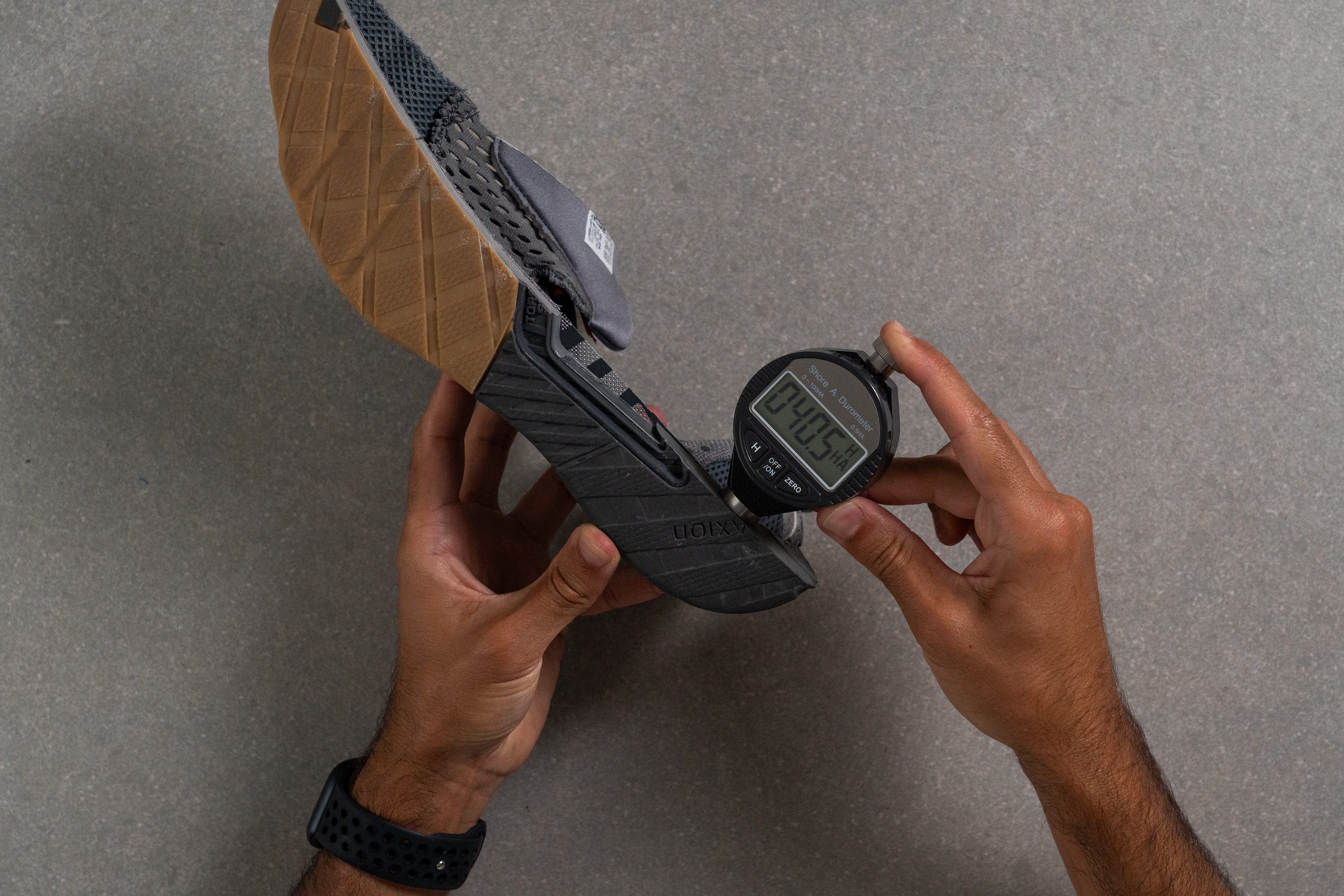
No wonder we felt so confident adding more weight to the barbell! The heel of this Adidas trainer is hardly compressible and it gave us a very stable and planted base to push off.
| Dropset 3 | 41.0 HA |
| Average | 27.8 HA |
Secondary foam
The softer foam, on the other hand, takes up the shoe's forefoot section. It is there to provide cushioning and impact protection for jumping and other plyometric movements.
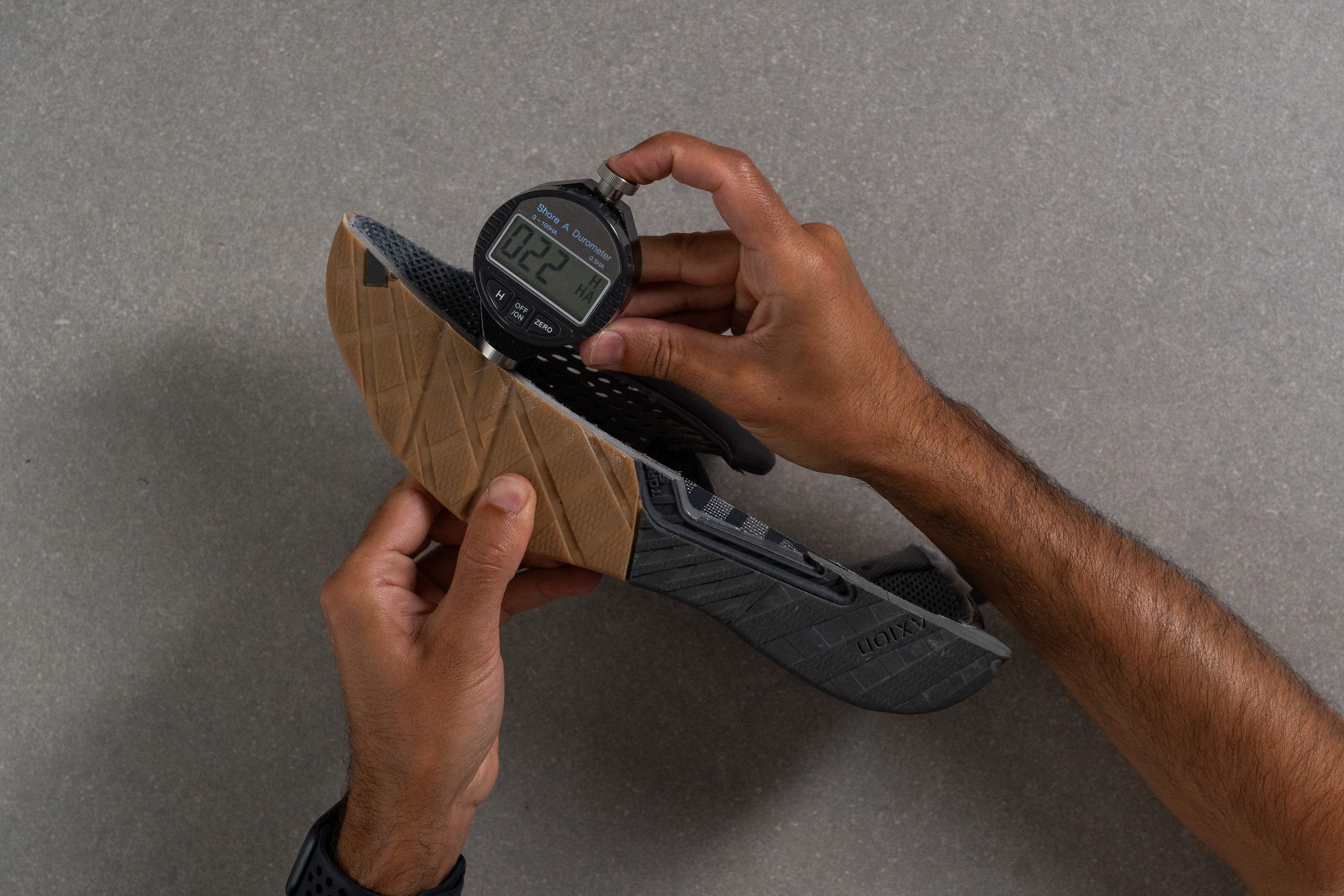
With a durometer reading of 21.5 HA, it is a whole 90% softer than the shoe's heel foam. However, don't expect a tonne of cushioning because the midsole is quite thin in the forefoot and the clunk of the heel is not very friendly for staying on your toes a lot.
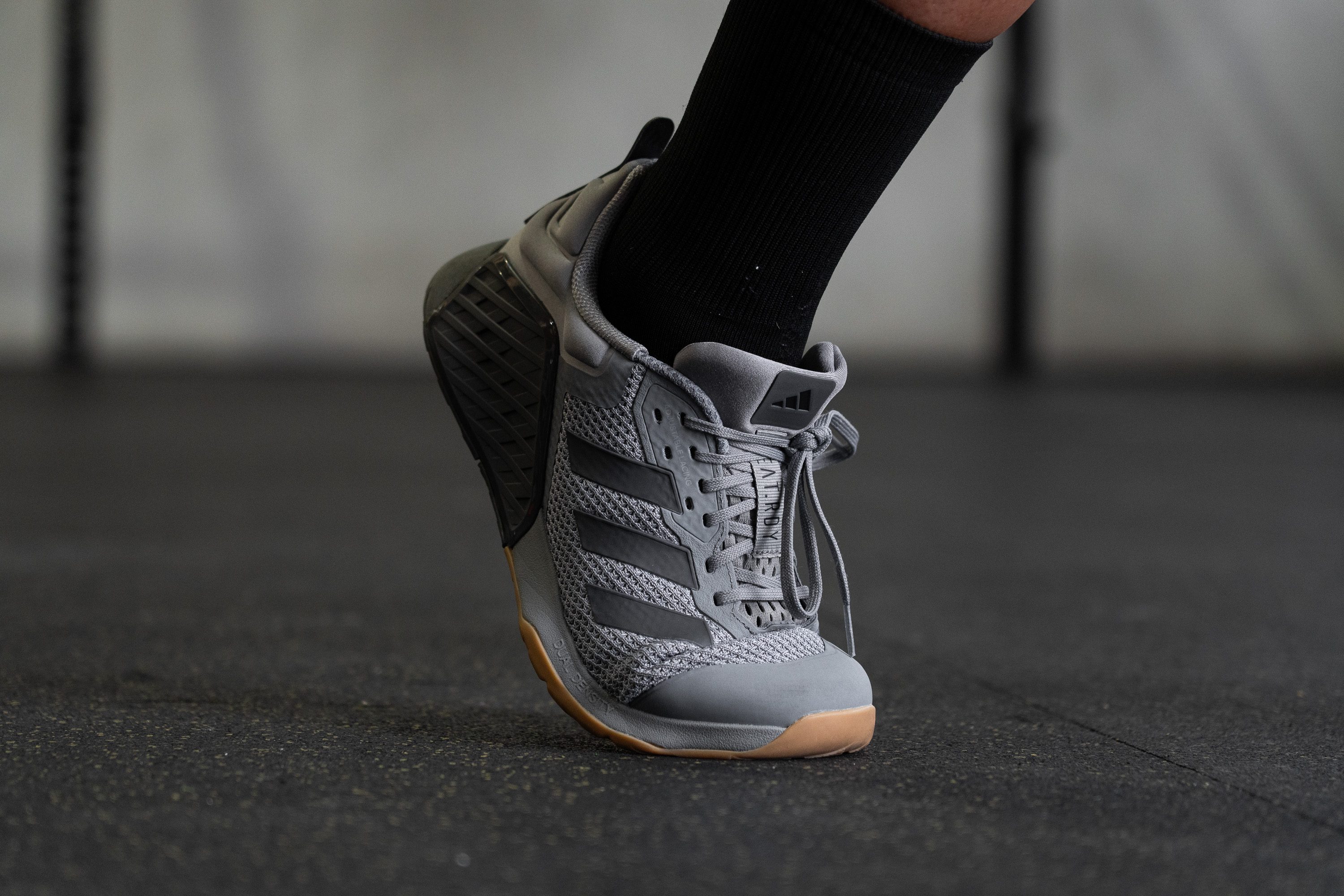
Thus, we recommend looking into Nike trainers like the Free Metcon 6 and the Air Zoom TR 1 for more agile workouts and cardio.
| Dropset 3 | 21.5 HA |
| Average | 35.1 HA |
Size and fit
Size
Adidas Dropset 3 fits true to size (238 votes).
Internal length
We recommend getting your regular shoe size in the Adidas Drposet 3.
The trainer fit exactly as expected in our regular men's US 9 and returned 268 mm of internal length in our calliper measurement.
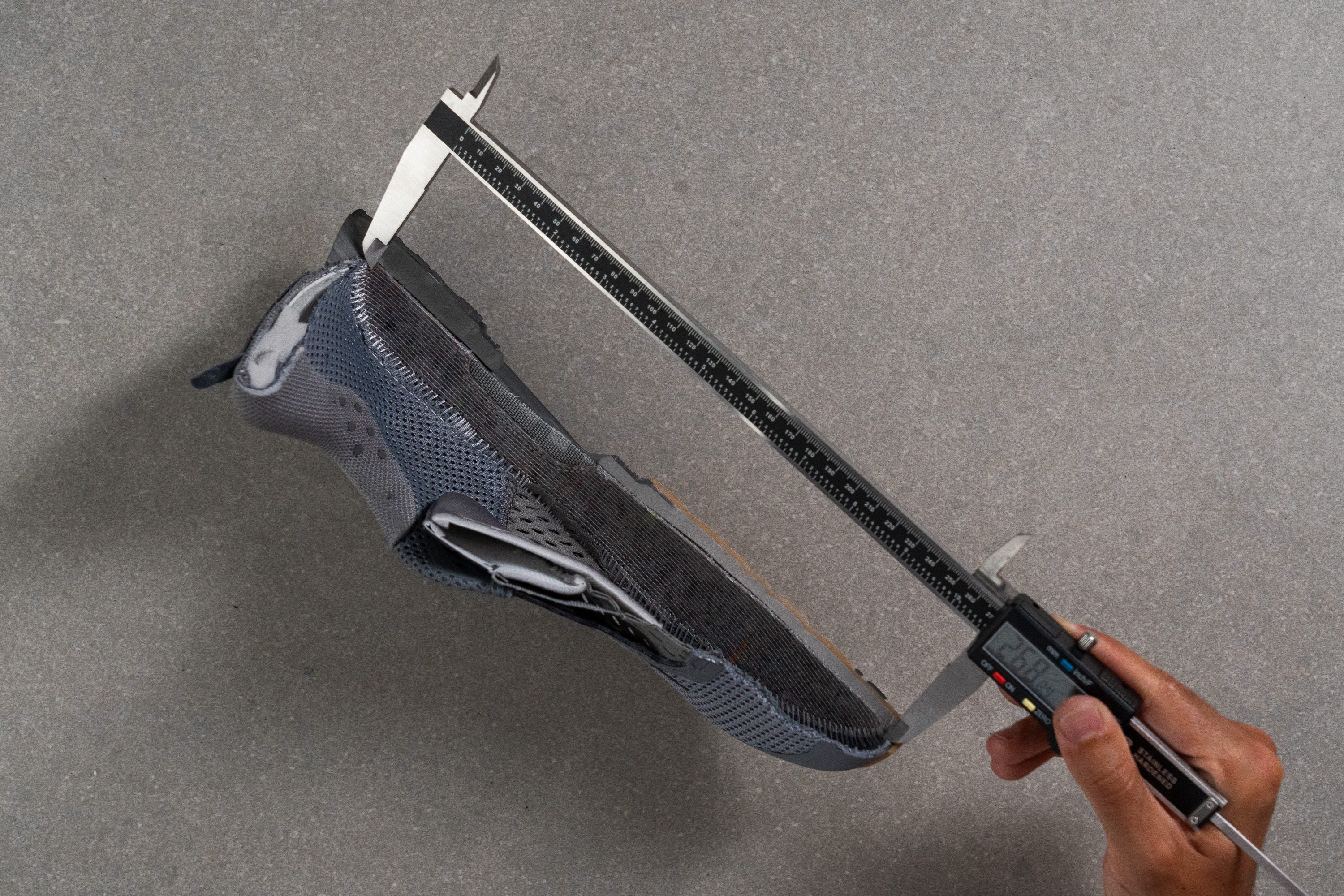
If you have even the slightest doubt about which Adidas size is right for you, we highly recommend measuring your foot length as accurately as possible and checking which Adidas size it corresponds to in the brand's size chart.
| Dropset 3 | 268.0 mm |
| Average | 268.9 mm |
Width / Fit
According to Adidas' product specs, the Dropset 3 offers a "Wide fit." But is it wide in relation to a typical running shoe or to an average cross-trainer? To answer that question, we created a gel mould of the Dropset's interiors and measured its width.
In the widest part of the mould, our calliper returned 98.1 mm. This is indeed wider than the average of running shoes but is only slightly wider than the average training shoe.
Thus, we think that athletes with medium-width feet will enjoy this pair.
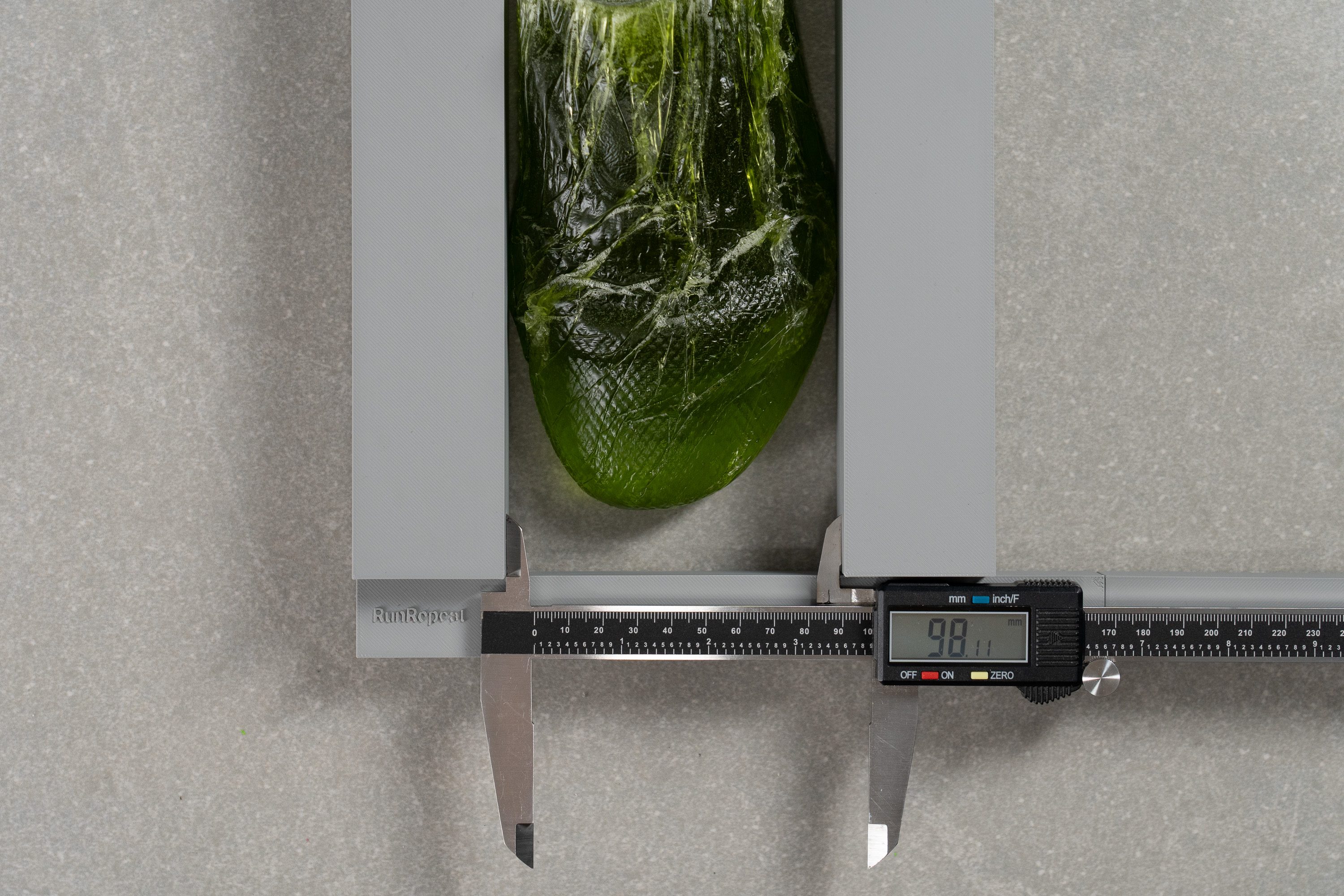
| Dropset 3 | 98.1 mm |
| Average | 96.6 mm |
Toebox width
As you can see from the mould, the Dropset 3 has a fairly rounded shape near the toes. This provides enough room for toes to spread and stabilise the rest of the body, especialy when heavy weight is involved.
Measuring the toebox width, we found that it is a tad bit wider than average at 73.6 mm.
But keep in mind that this Adidas shoe is still within the medium range of cross-trainers, so if you are looking for maximum toebox space (for your wide feet or bunions), check out the Nike Metcon 9 or the Inov8 F-Lite Max.
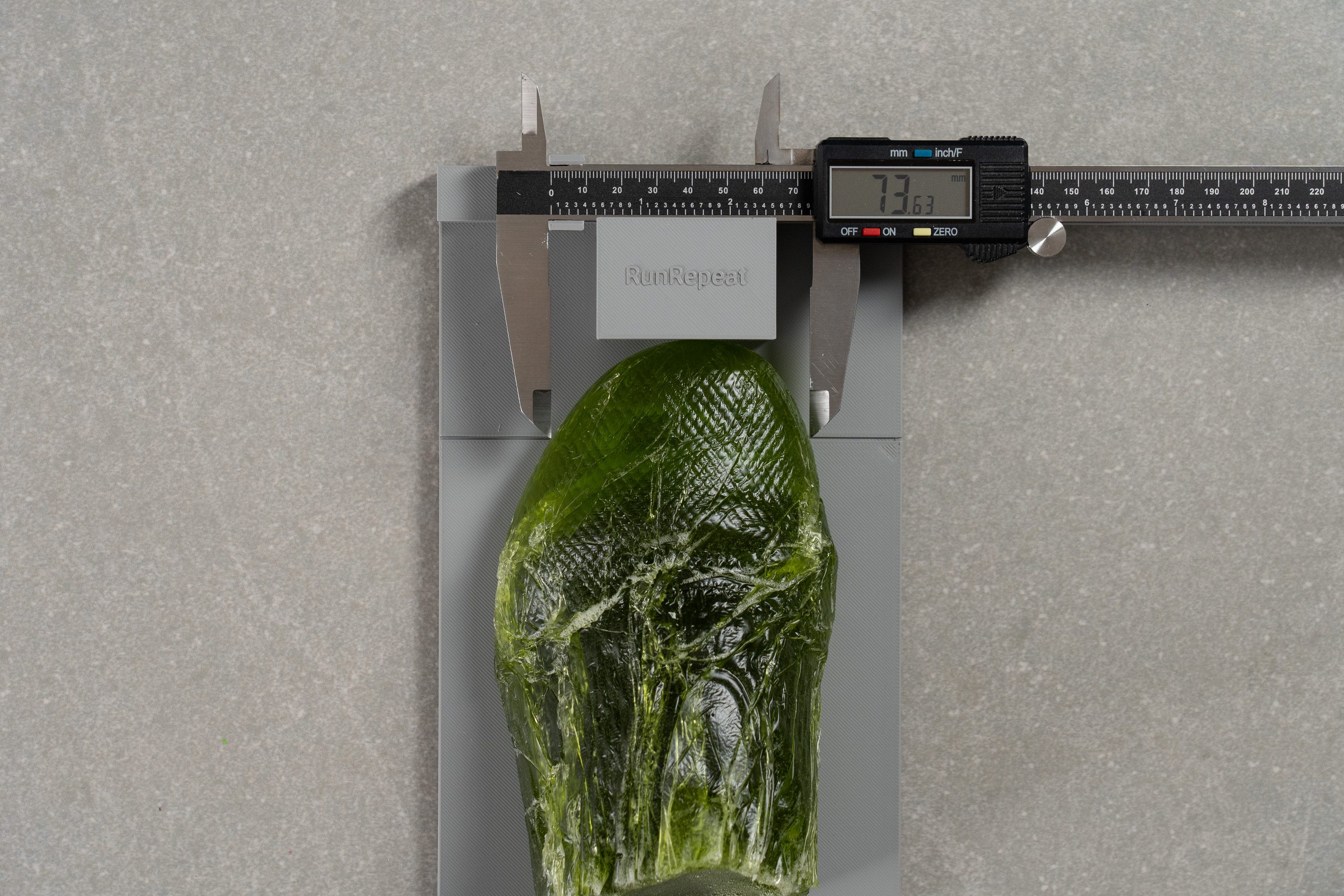
| Dropset 3 | 73.6 mm |
| Average | 73.5 mm |
Toebox height
Even though a big part of the Dropset's toebox is covered with a protective rubber overlay, we experienced no pressure on top of our toes.
Measuring the shoe's toebox height at 27.2 mm confirmed that it is just on par with the average.
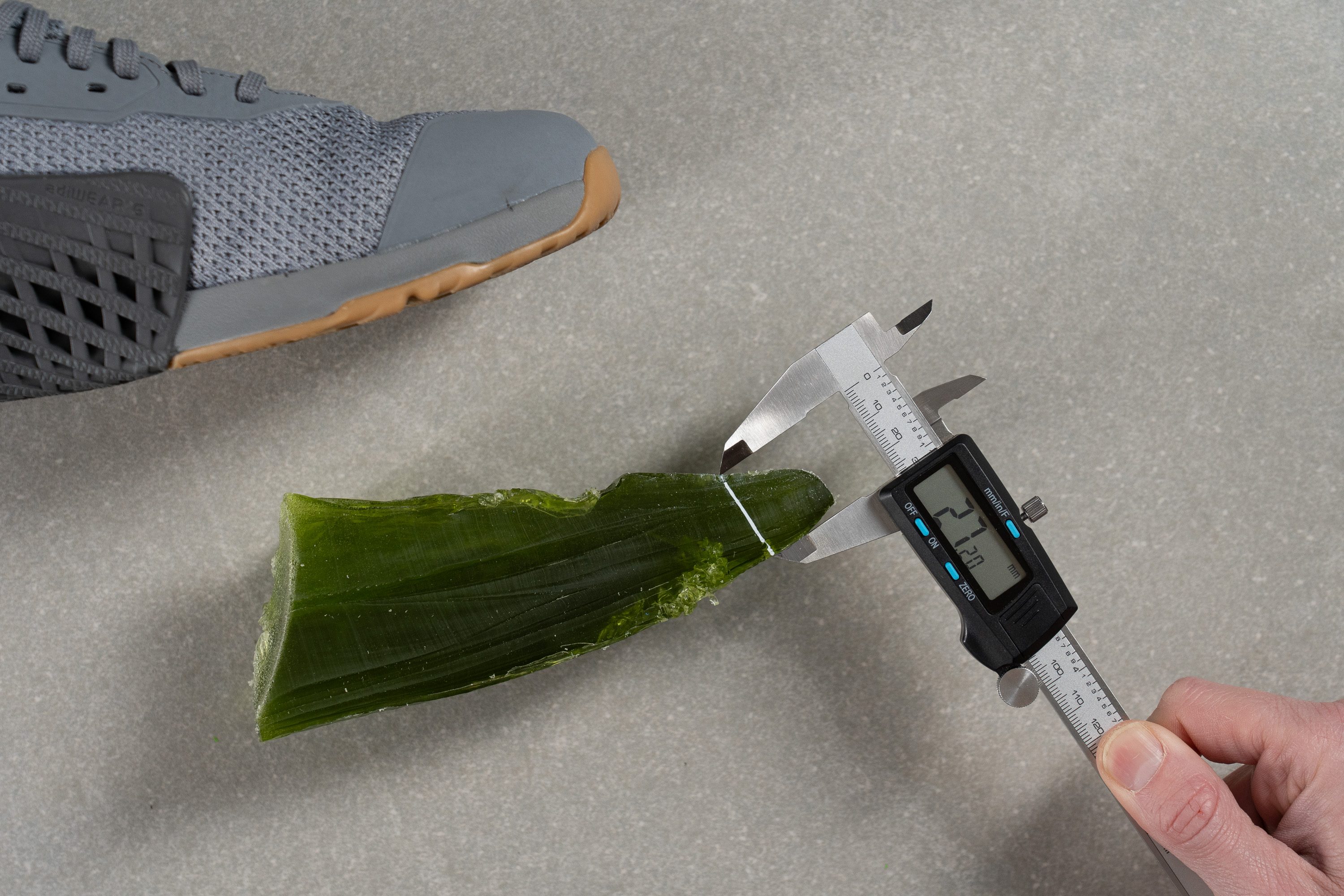
| Dropset 3 | 27.2 mm |
| Average | 27.1 mm |
Laces
Considering the Dropset 3's spacious toebox, some people may need to tighten up the midfoot fit to avoid undue foot shifting.
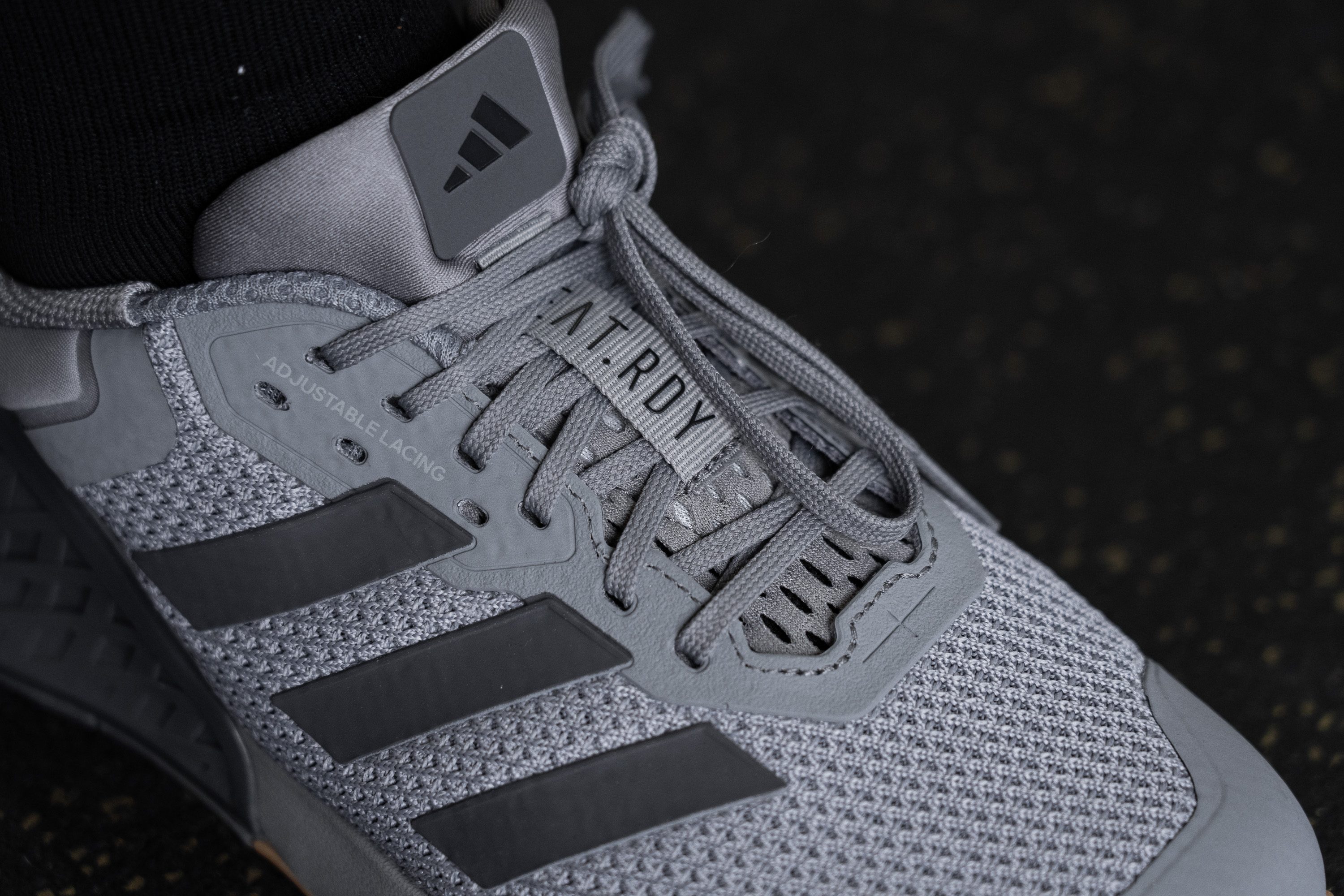
Adidas provides that option with as many as three pair of additional eyelets.
Traction / Grip
Forceful multi-directional movements felt surefooted thanks to the grippy outsole of the Dropset 3. We felt like our stopping power was enhanced with the stripes of the brand's proprietary Traxion pattern.
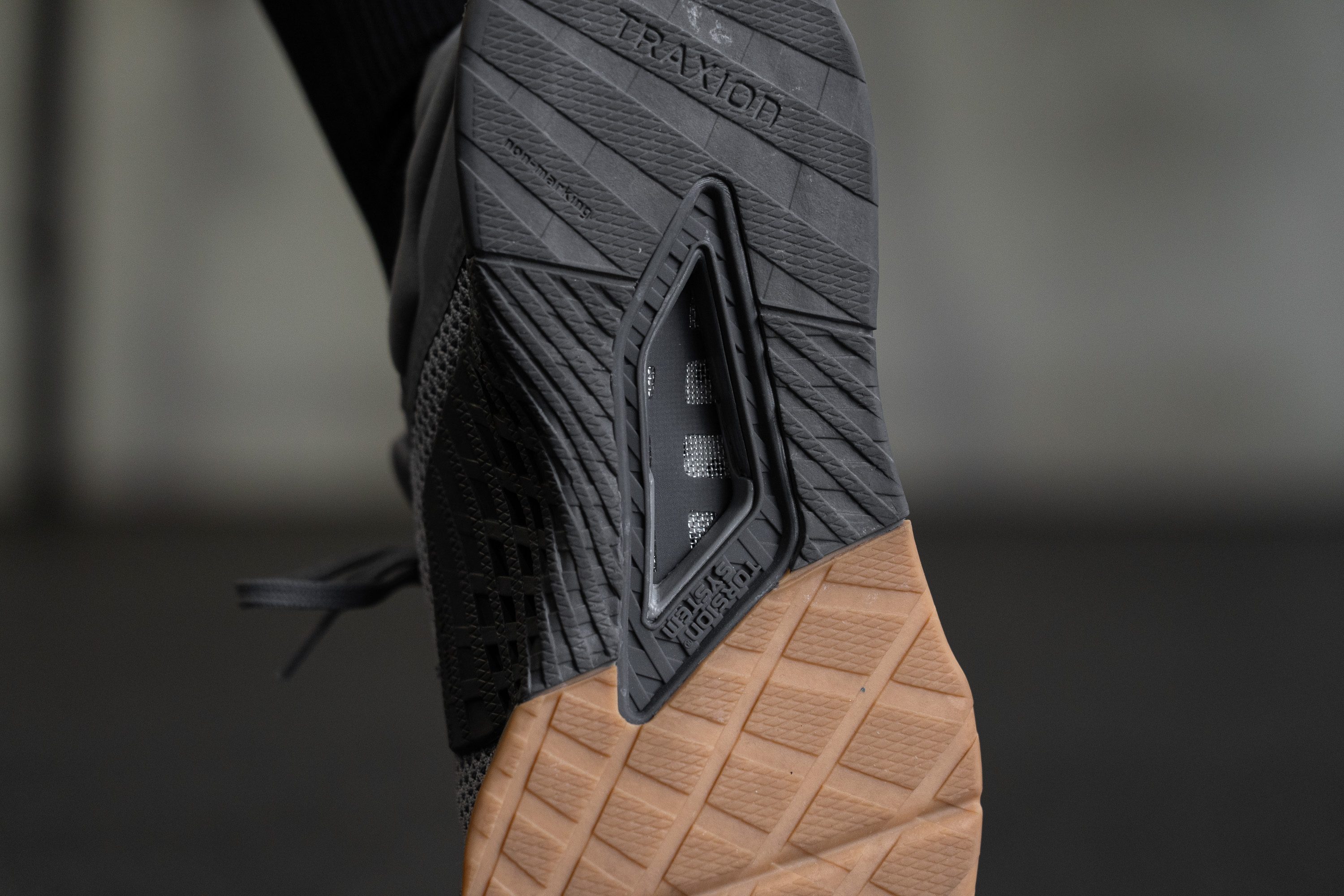
The shoe's outsole bit onto smooth gym surfaces from all angles and never slipped even when the floor got wet.
Traction test
Based on the results of our grip test, the Dropset 3's Traxion outsole has an above-average friction score of 0.39 ensuring great bite on rubber and hardwood gym floors. It is also capable of maintaining grip on dusty and sweaty surfaces as well as plywood boxes and platforms.
| Dropset 3 | 0.39 |
| Average | 0.33 |
Outsole design
Prioritising stability and planted stance in the Dropset 3, Adidas uses shallow but textured treading to provide grip without detracting from the ground contact.
Another distinctive feature of this trainer is of course the midfoot cutout which not only serves as a ventilation channel but also incorporates the shoe's stabilising Torsion System.
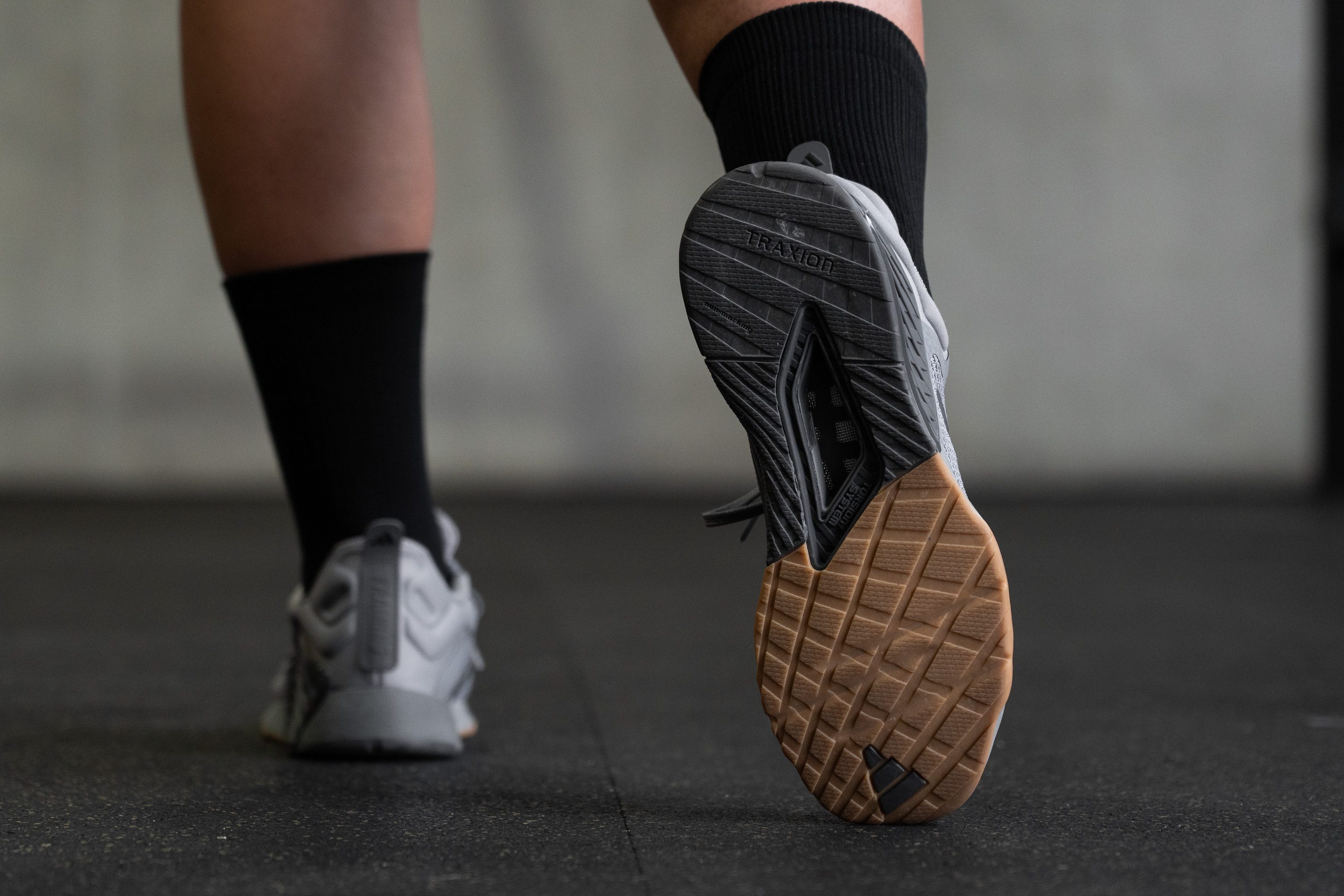
Flexibility / Stiffness
With its softer and thinner forefoot, the Dropset 3 proved to be even more flexible than the average cross-trainer! It felt a tad bit more forgiving for burpees, lunges, and planks than the previous Dropset. Perhaps thanks to the softer and stretchier upper mesh?
Our shoe bending machine confirmed our initial impression by showing that the trainer needed only 8.3N to bend to a 30-degree angle.
But even though it proved to be a whole 25% bendier than average, we still can't recommend the Dropset 3 for walking and running (over 1 mile) because of its clunky heel design.
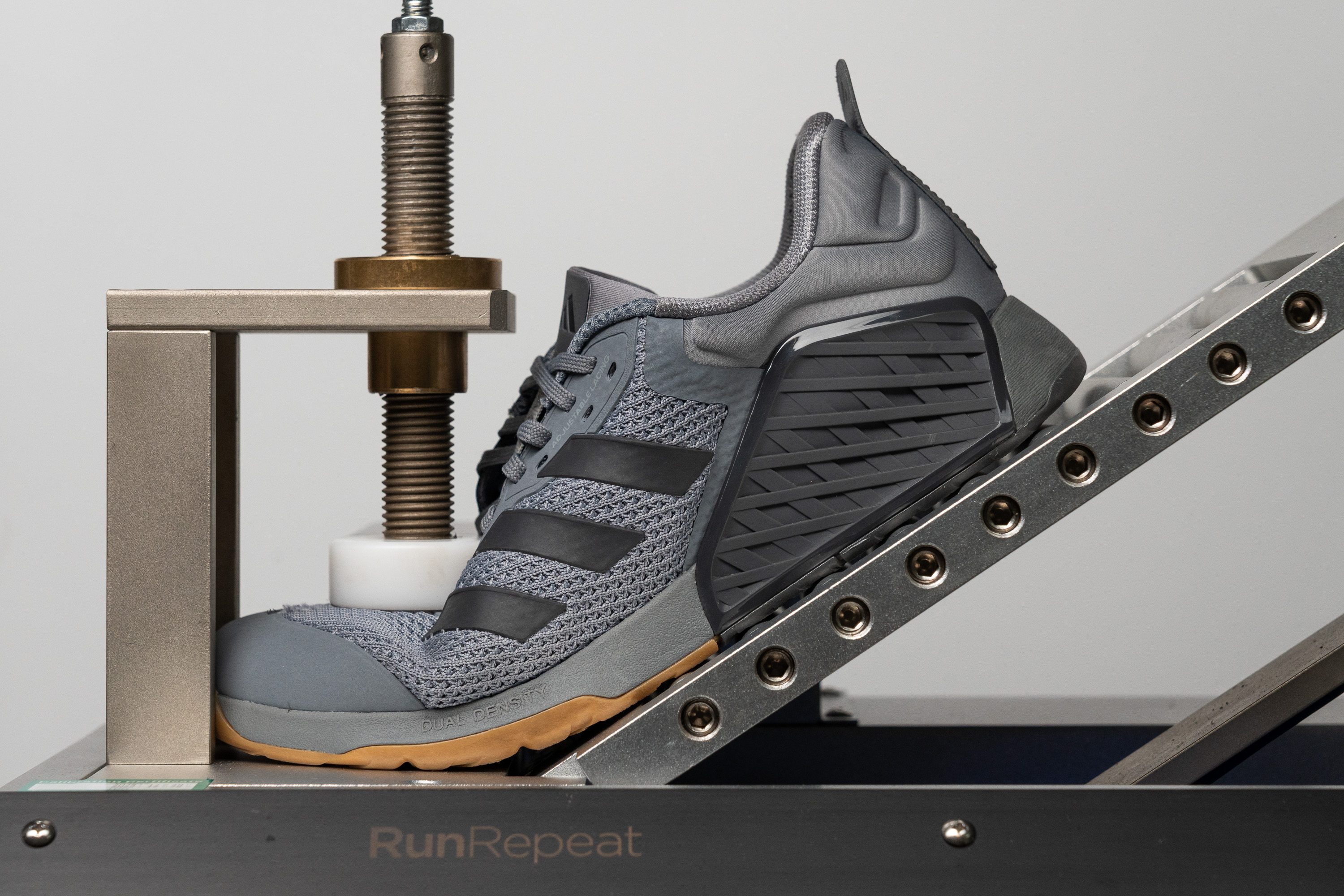
| Dropset 3 | 8.3N |
| Average | 10.2N |
Weight
Tipping the scale at 12.1 oz (343g), the Dropset 3 is about an ounce heavier than average but that's not enough to call it out for being hefty.
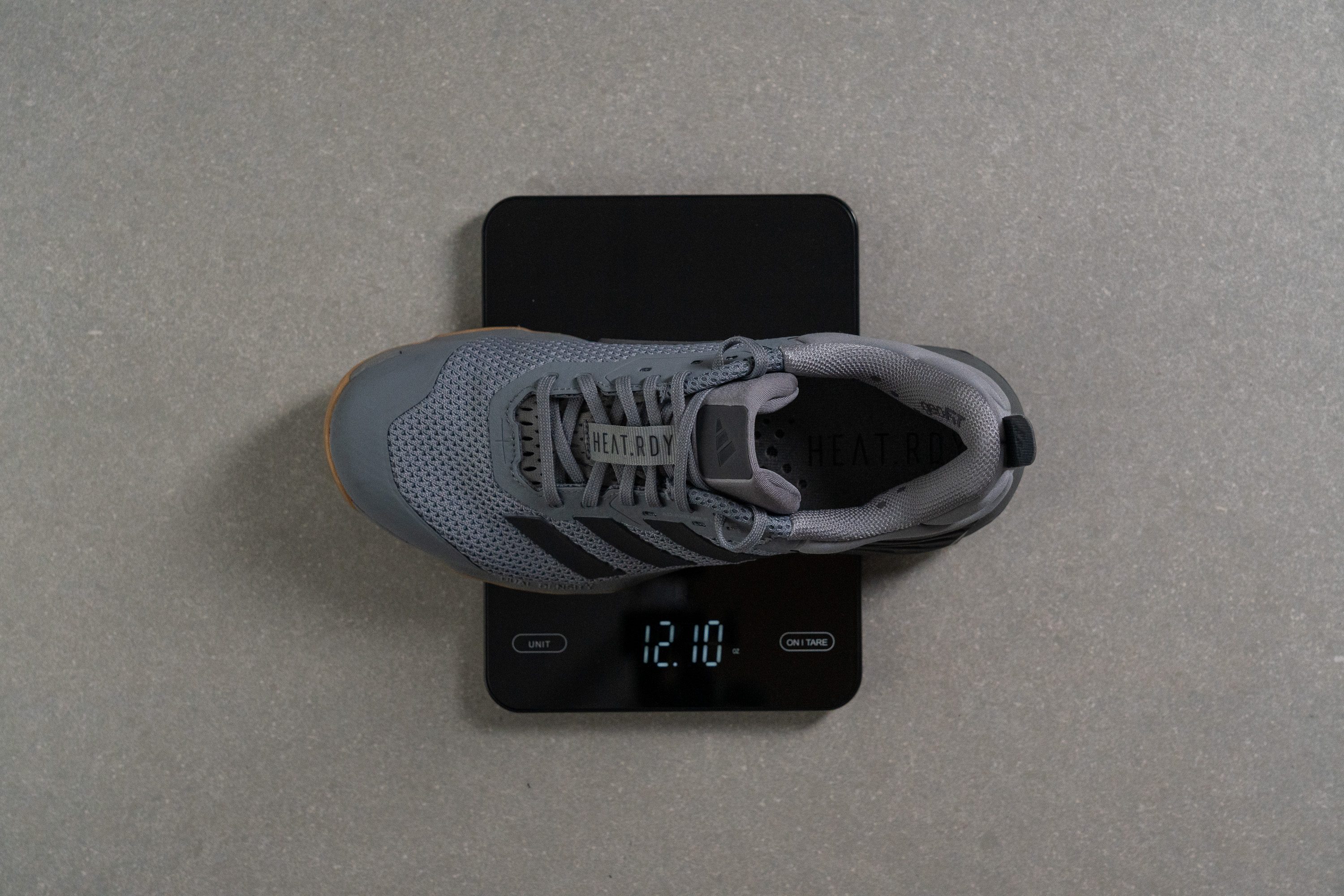
We believe that it has a fair weight considering the shoe's focus on stability and lifting. And it is still an ounce lighter than the Nike Metcon 9 (13.4 oz/378g).
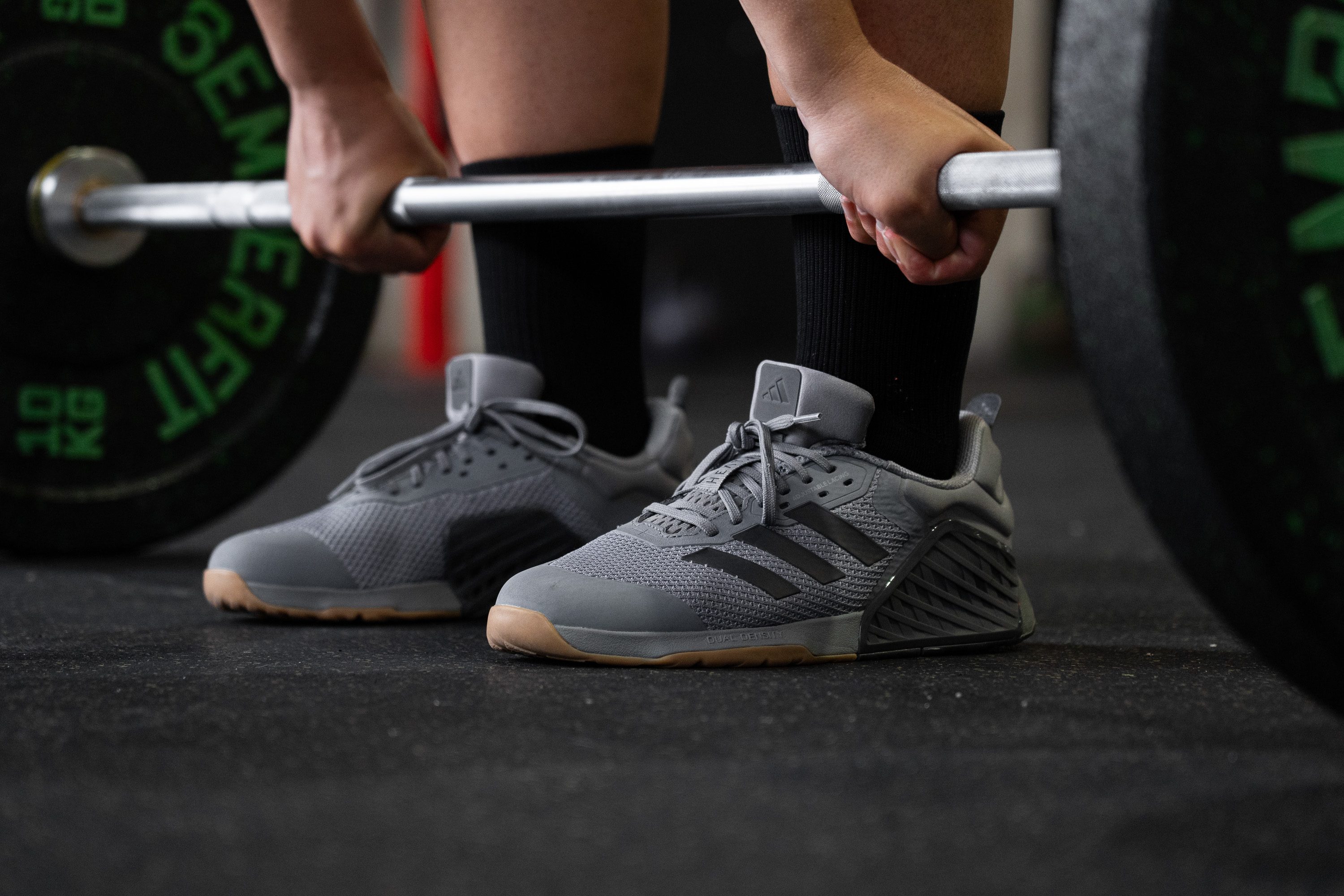
| Dropset 3 | 12.1 oz (343g) |
| Average | 10.7 oz (304g) |
Breathability
Adidas' approach to ventilation in the Dropset 3 is impossible to beat!
First introduced in the Dropset 2, the HEAT.RDY technology features a large aperture right in the middle of the shoe's sole. As our wear tests showed, it expelled the heat from the shoe almost instantly keeping our feet nice and fresh at all times.
As part of the HEAT.RDY tech, the shoe's insole is also perforated to provide unobstructed airflow straight to the foot.
But let's not forget about the trainer's breathable mesh too. Our smoke-pumping test revealed that the fabric lets the air in and out quite freely.
Even though the material appears to be pretty tightly woven, we discovered plenty of ventilation holes in the shoe's chainlinking through our microscope.
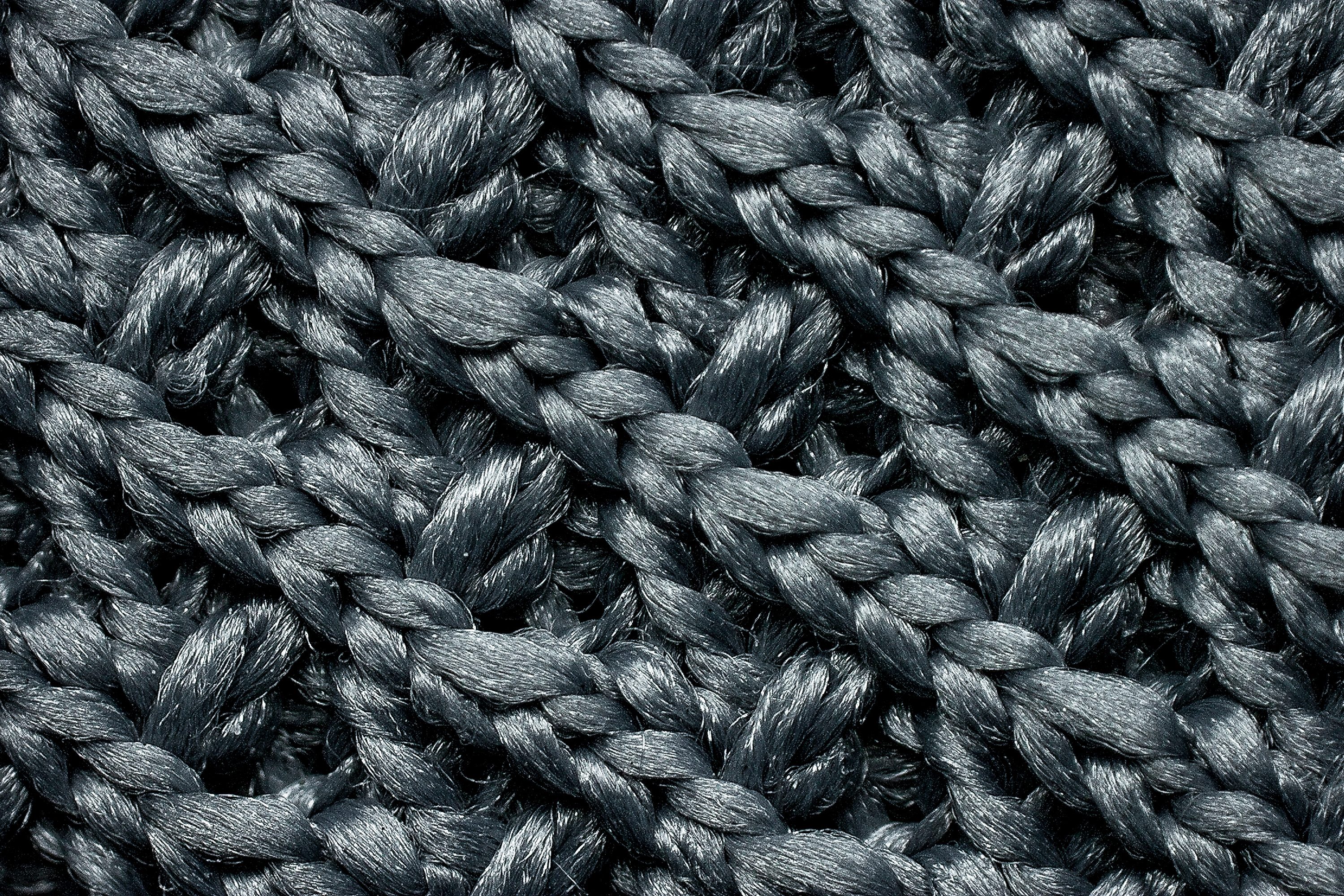
All in all, we think the Adidas Dropset 3 deserves the highest breathability score for its amazingly well-ventilated design.
The only caveat is that the sole apertures make this trainer unsuitable for outdoor wear, especially in the rain.
| Dropset 3 | 5 |
| Average | 3.6 |
Stability
Lateral stability test
We think the Adidas Dropset series deserves a much bigger spotlight on the training shoe market.
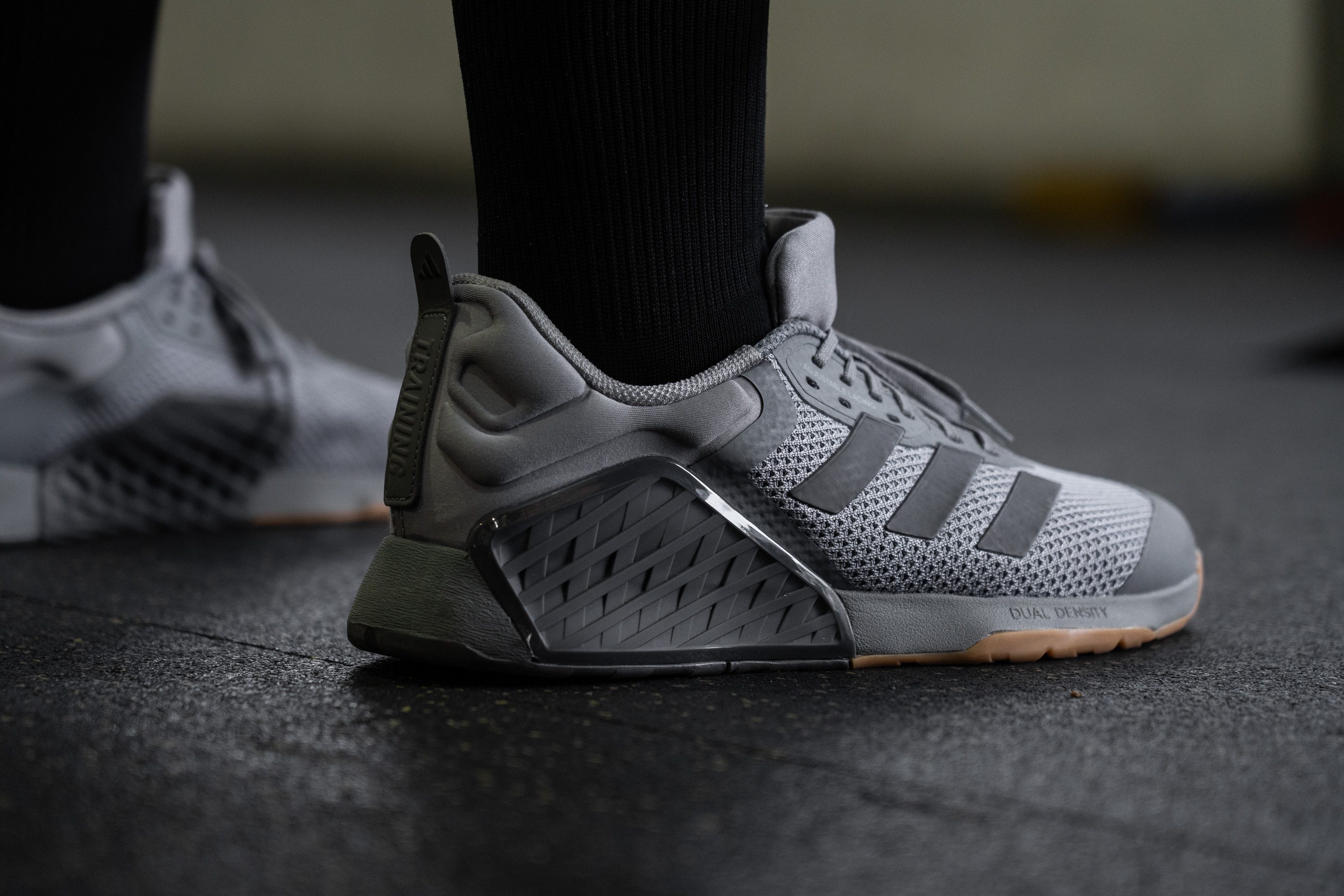
Together with the Nike Metcons, we found it to be some of the best options for weightlifting because of its incredible stability.
We forgot what wobbling even feels like as we picked up the load in the Dropset 3. The most obvious stability components in the shoe are, of course, the TPU wall on the lateral side and the firm rubber overlay on the medial side.
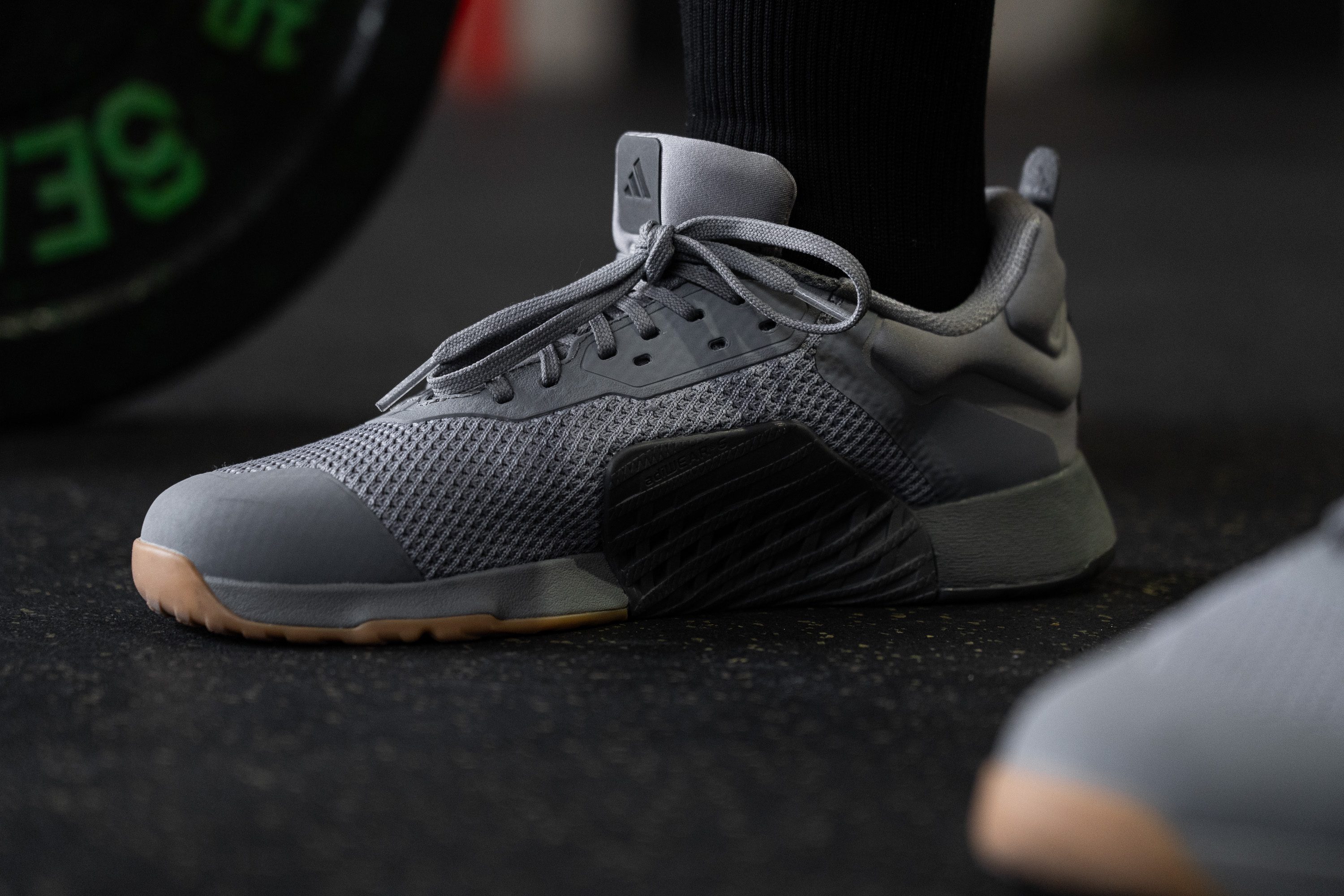
Looks like the third iteration didn't change anything from the v2 in this department. So we got to reap the same stability benefits but in a refreshed silhouette.
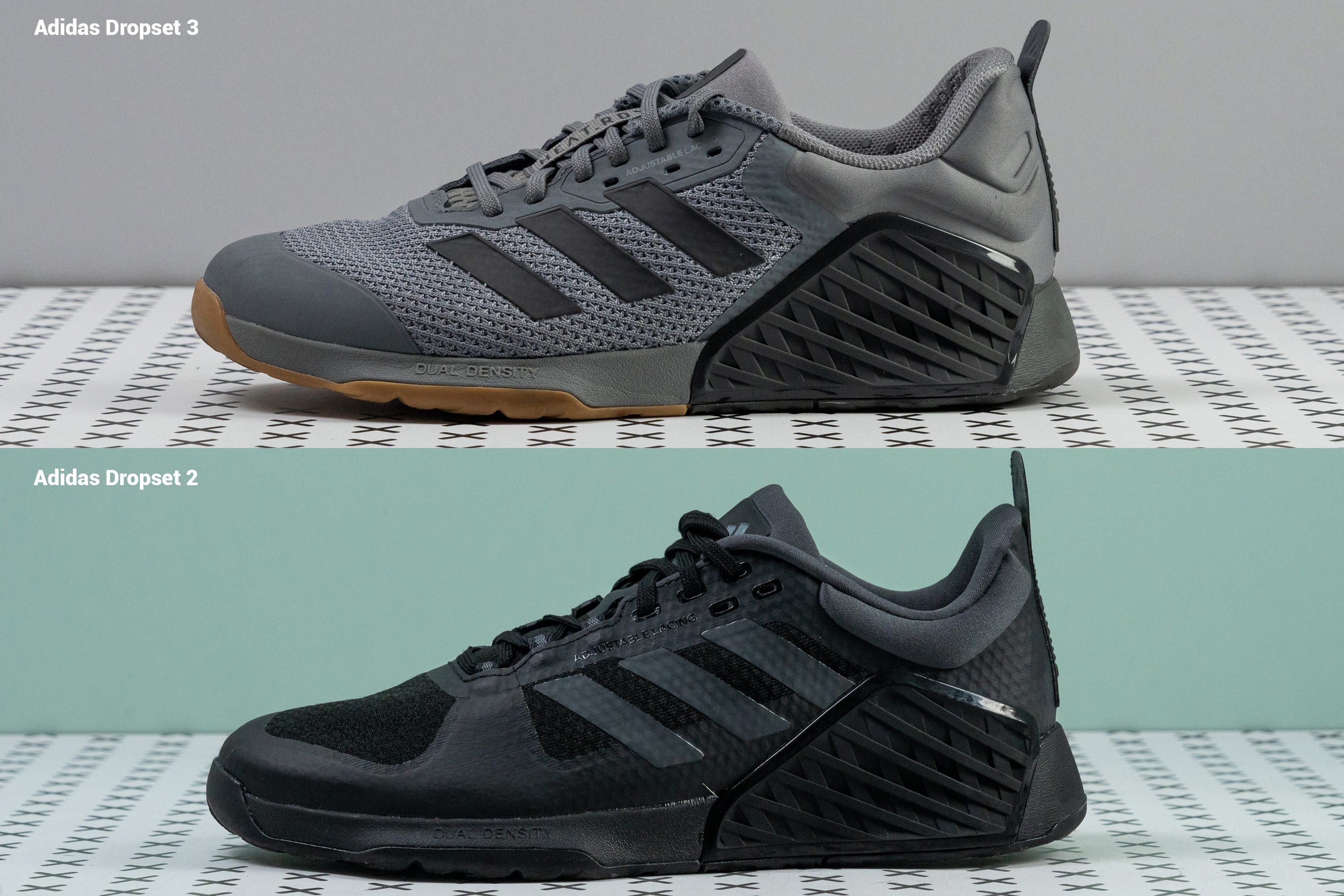
Torsional rigidity
To our great surprise, the Adidas Dropset 3 kept some torsional flexibility despite the large and stiff sidewalls.
We were able to enjoy sufficient forefoot flexibility without feeling as if we lost anything in the stability department. Assessing the shoe's side-to-side stiffness on a 1-5 scale, we gave it a middle-of-the-road score of 3.
| Dropset 3 | 3 |
| Average | 2.9 |
Heel counter stiffness
There is a similar case with the shoe's heel counter - it is highly rigid at the base of the heel but has a lot of give in the collar. We were able to push and squeeze it quite easily in our manual test which lowered the stiffness score to 3 out of 5.
And yet, there was not even a hint of heel slippage or foot play inside the shoe! Our heels and ankles felt securely locked inside the Dropset 3 without the unnecessary stiffness that often comes with structured heel counters.
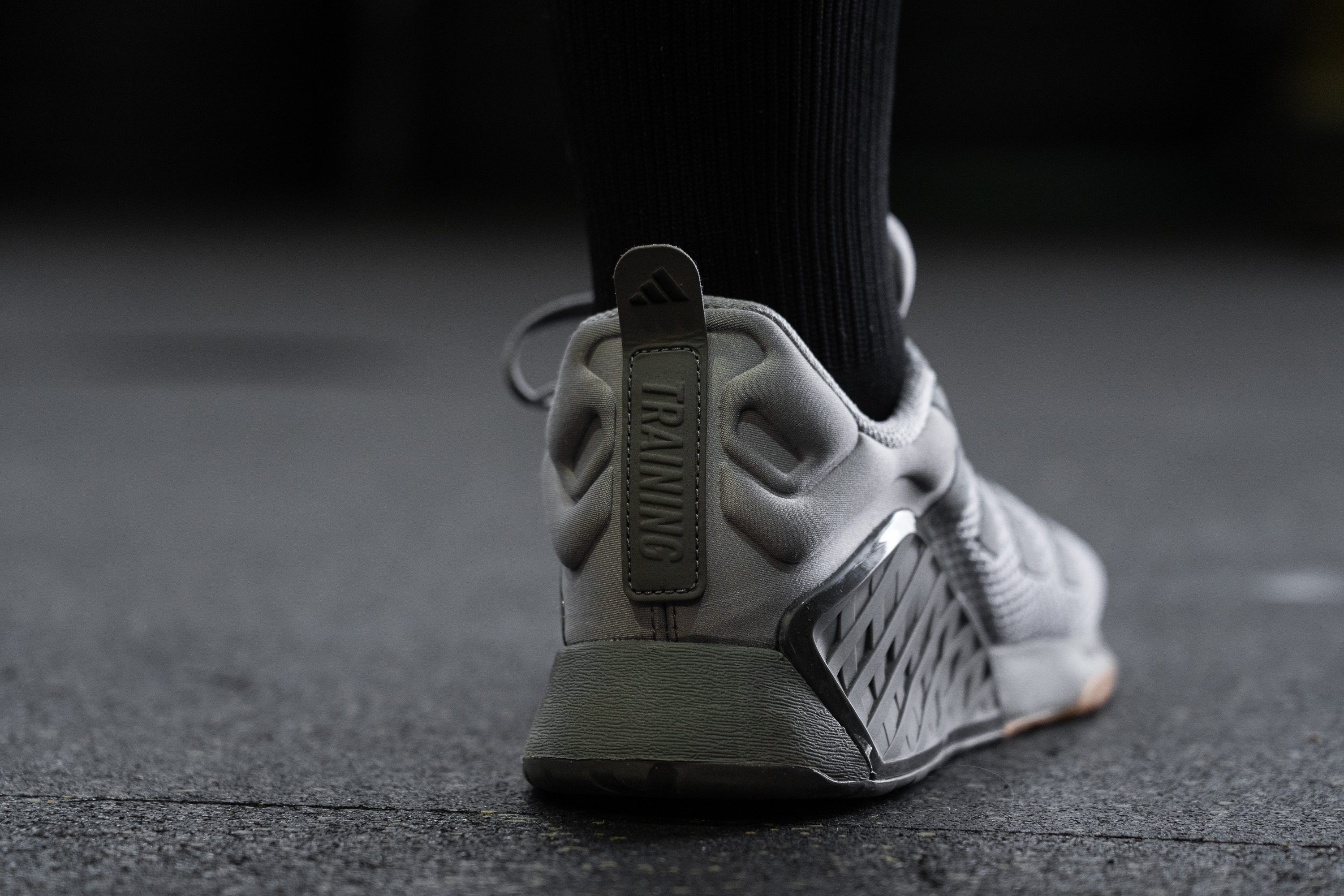
The shoe's GeoFit Sensepods also play a key role in making the foothold so secure. It adds extra padding around the ankle to keep the rearfoot in place.
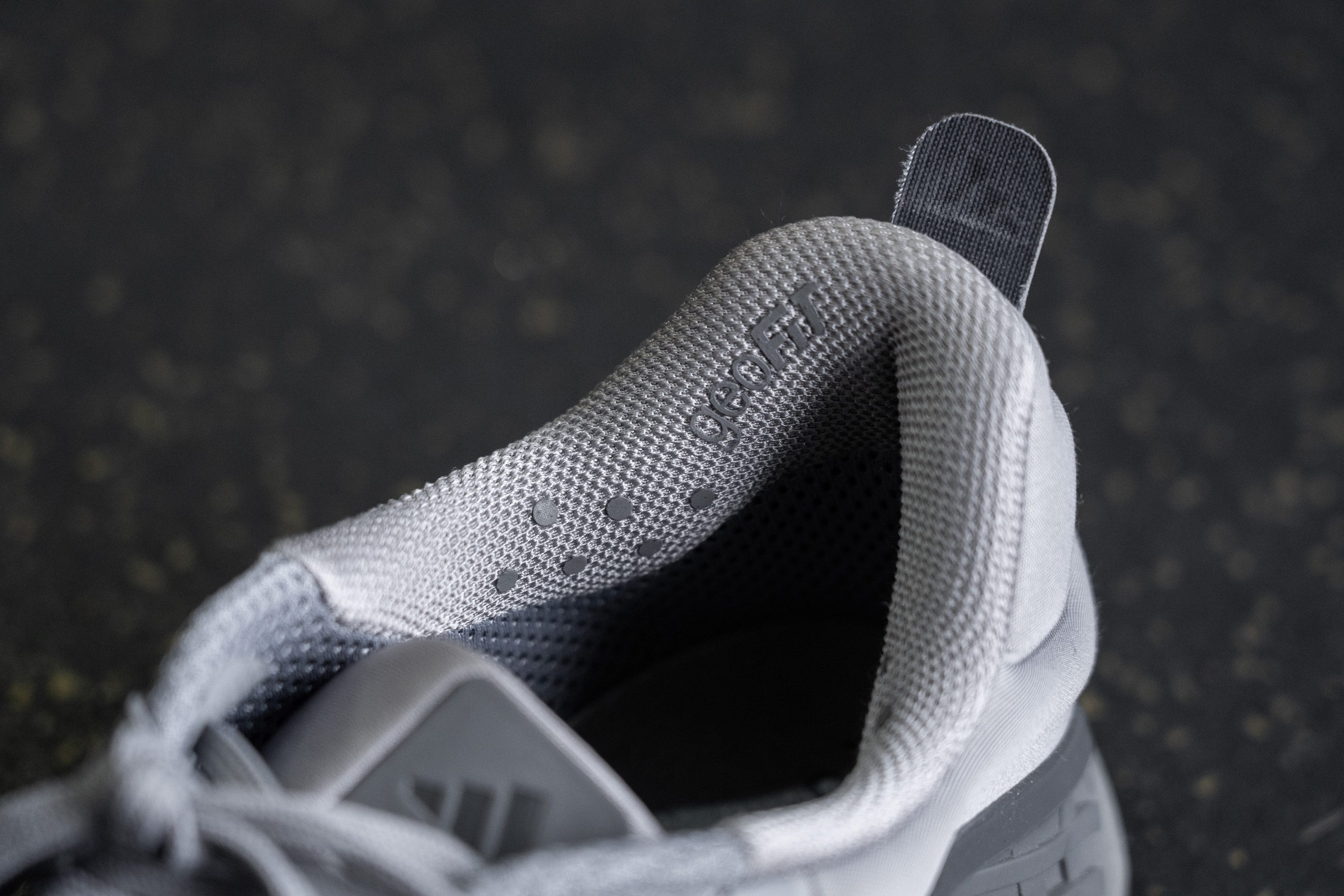
We were especially grateful for having such a steady heel during single-leg exercises.
| Dropset 3 | 3 |
| Average | 2.7 |
Midsole width - forefoot
Of course, the shoe's stable construction wouldn't be complete without a wide base. And the Adidas Dropset 3 beats records in this regard.
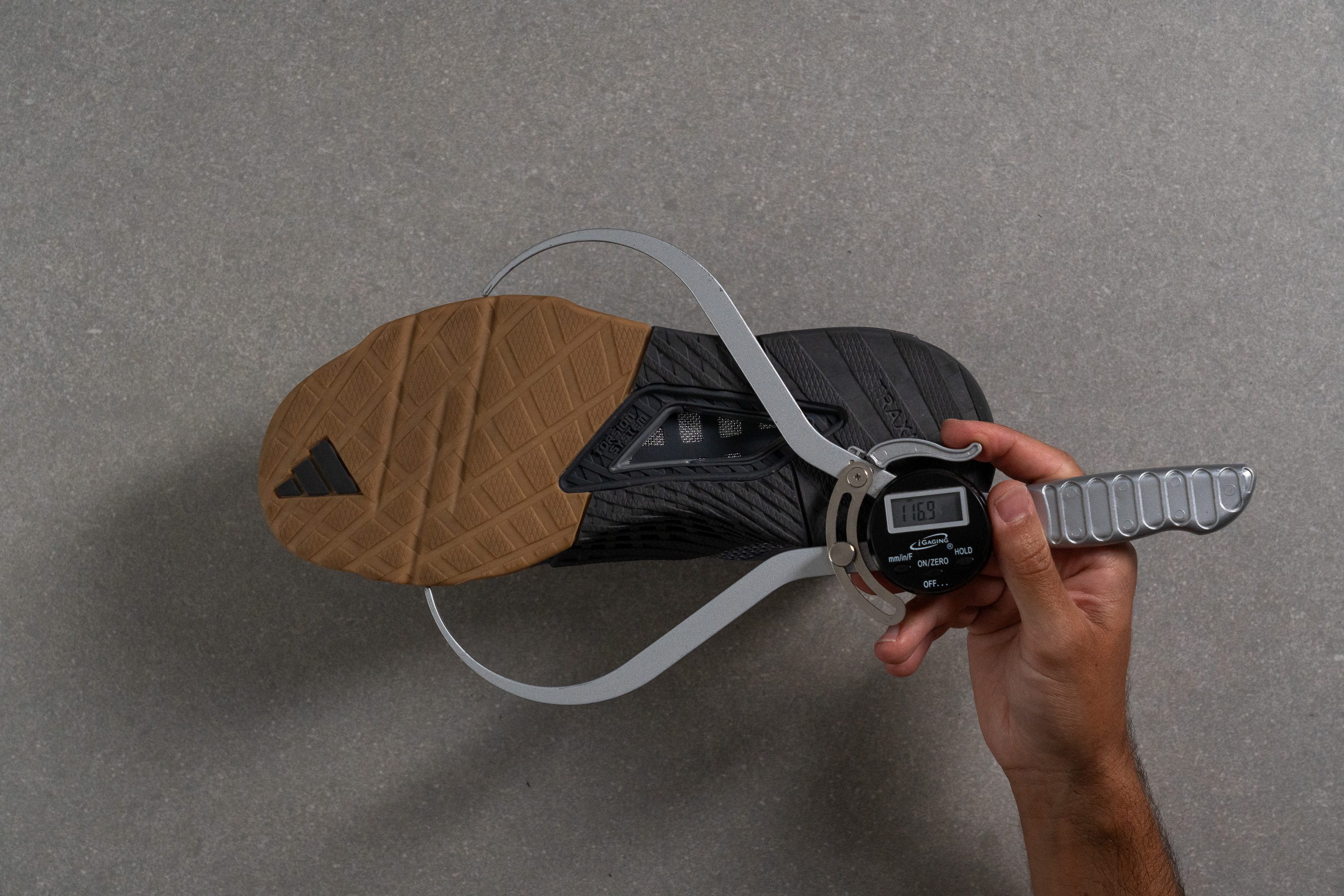
In the widest part of its forefoot, our calliper measured an impressive 116.9 mm. That is about 6.5 mm wider than the average trainer!
That gave us plenty of area to rely on while stabilising our footing during the wear test.
| Dropset 3 | 116.9 mm |
| Average | 110.9 mm |
Midsole width - heel
Even though the shoe's heel is not as impressively wide, we measured its widest area to be on par with the gym shoe average - 88.9 mm.
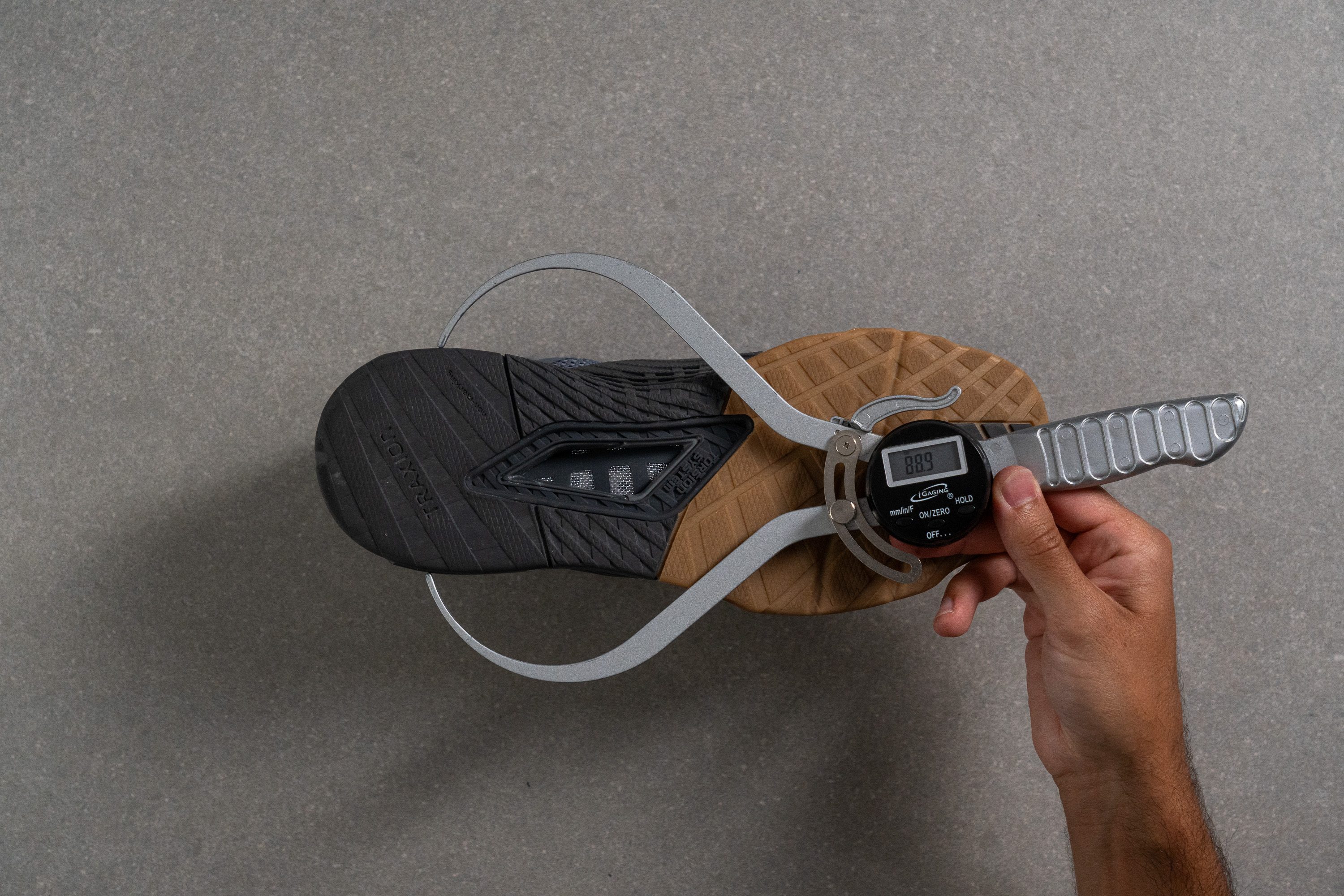
| Dropset 3 | 88.9 mm |
| Average | 86.9 mm |
Durability
Toebox durability
It's nice to have some toebox reinforcement as you power through a burpee challenge or any other exercise with lots of intense foot brushing against the floor.
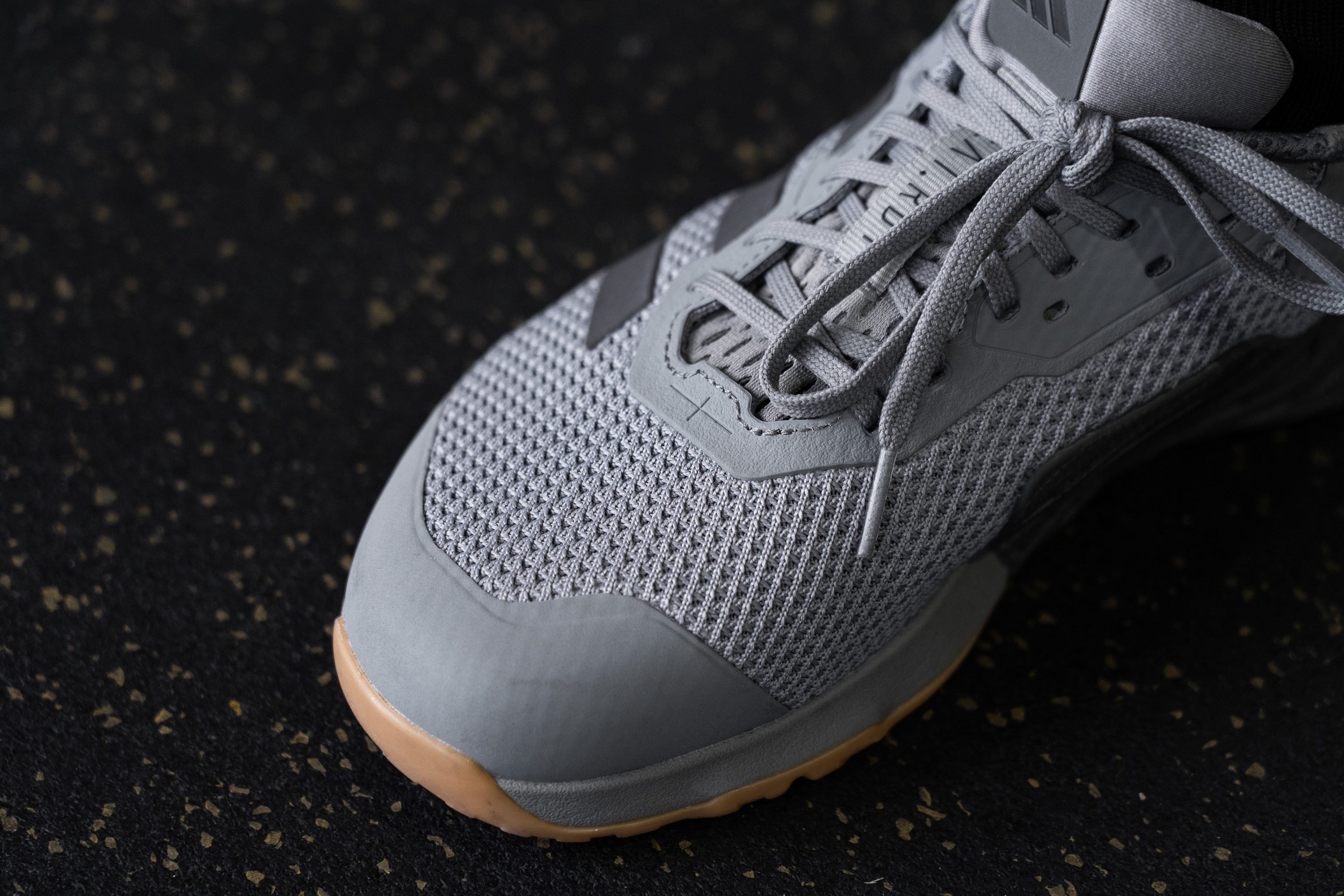
The Dropset 3 features a pretty large synthetic overlay over the mesh to keep the fabric safe from wear and tear. Let's see how it stands up against our Dremel test.
The synthetic bit gave up to the sandpaper tip pretty quickly exposing mesh to faster abrasion. Thus, the trainer lost a couple of points getting only 3 out of 5 for toebox durability.
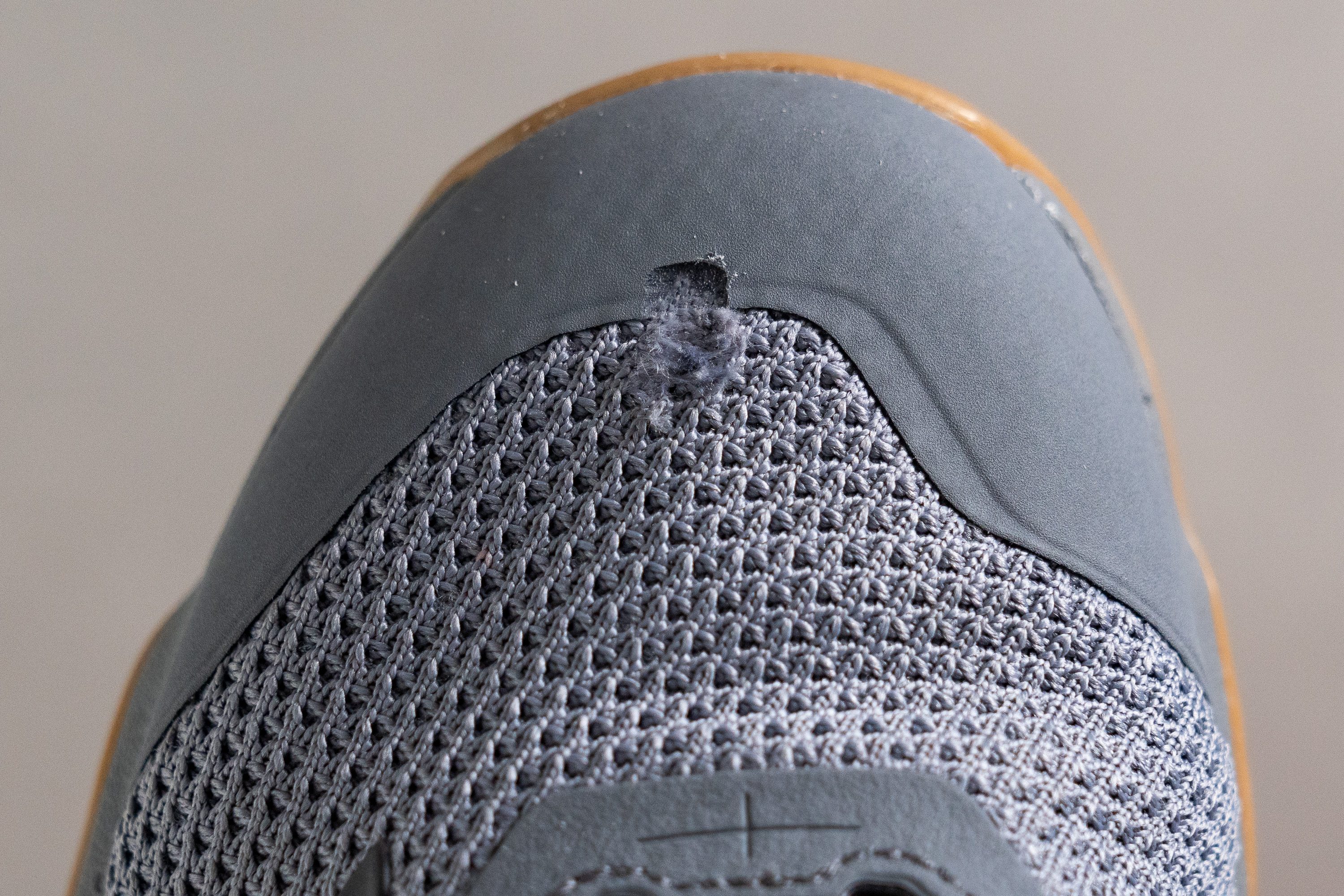
| Dropset 3 | 3 |
| Average | 2.7 |
Heel padding durability
Even though the shoe's inner lining is not subject to external damage, it can wear out just as easily from the intense friction of the foot.
We tested both the collar fabric and the mesh lining with a 4-second Dremel drill...
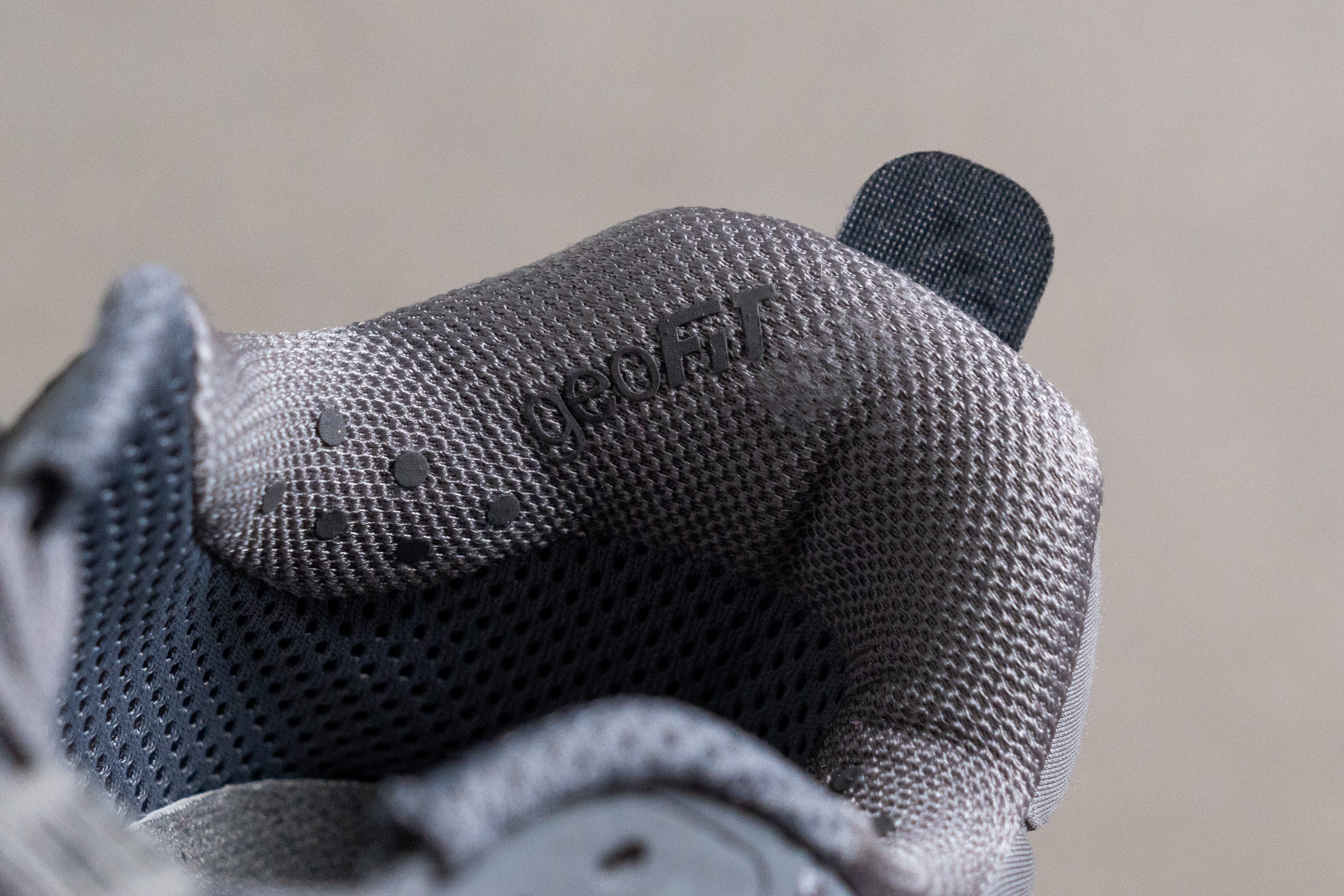
...and it remained unscathed! That's a solid 5 out of 5 for heel padding durability on our end.
| Dropset 3 | 5 |
| Average | 2.9 |
Outsole hardness
On the upside, the Dropset 3's Adiwear outsole left us no doubts about its durability.
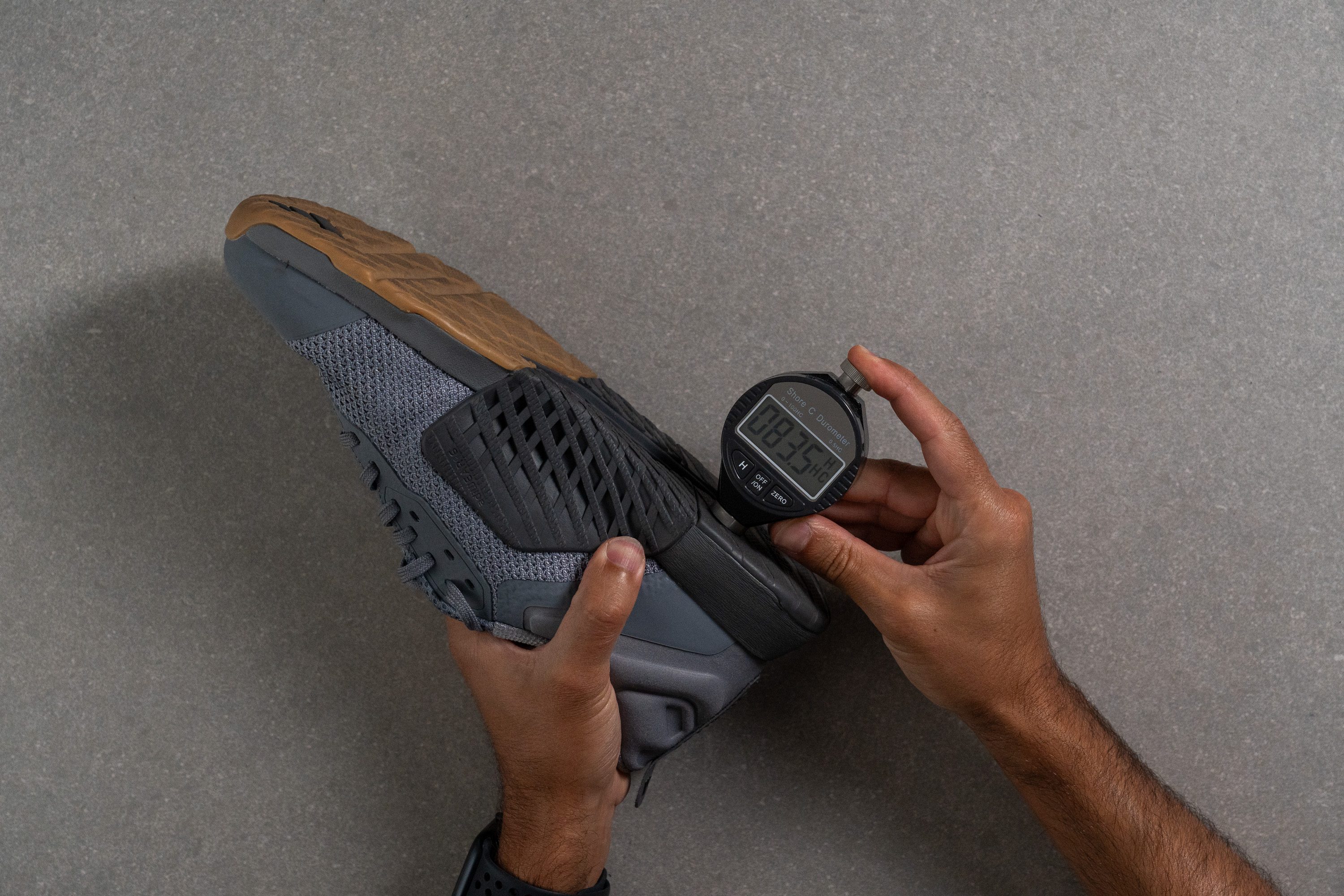
First of all, we found it reassuringly hard based on our Shore C durometer reading of 84.0 HC. That's a solid hardness for a training shoe outsole and is a good indicator of longevity.
| Dropset 3 | 84.0 HC |
| Average | 83.2 HC |
Outsole durability
Drilling the rubber compound with sandpaper further proved its ability to resist abrasion. After 22 seconds of applying the Dremel to the same sport at 10K RPM speed, the dent was hardly even noticeable.
Our tread gauge helped us measure the damaged area and it showed as little as 0.5 mm! Impressive result for a trainer.
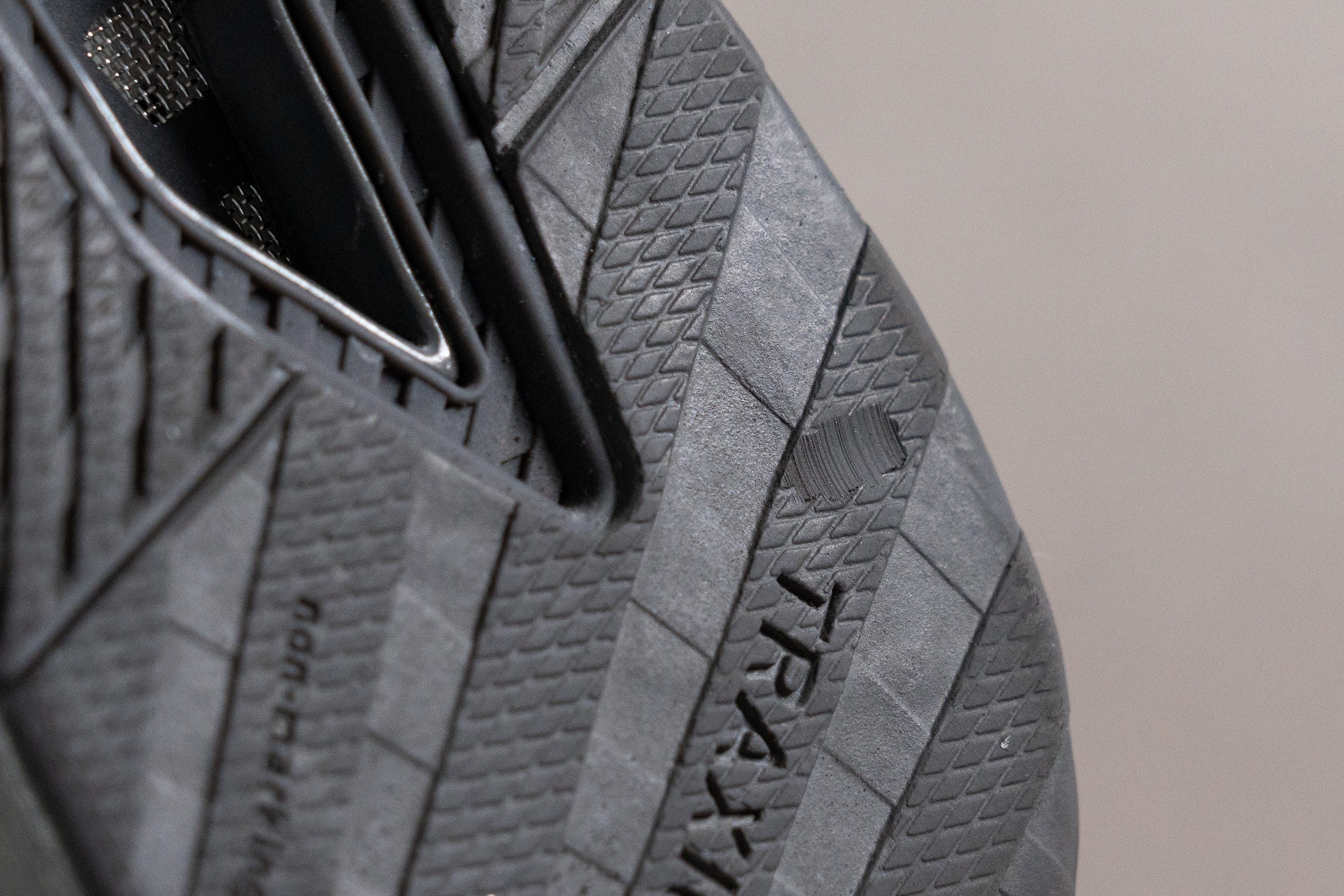
| Dropset 3 | 0.5 mm |
| Average | 1.1 mm |
Outsole thickness
Finally, we measured the shoe's outsole thickness at 3.2 mm which is within the industry standard.
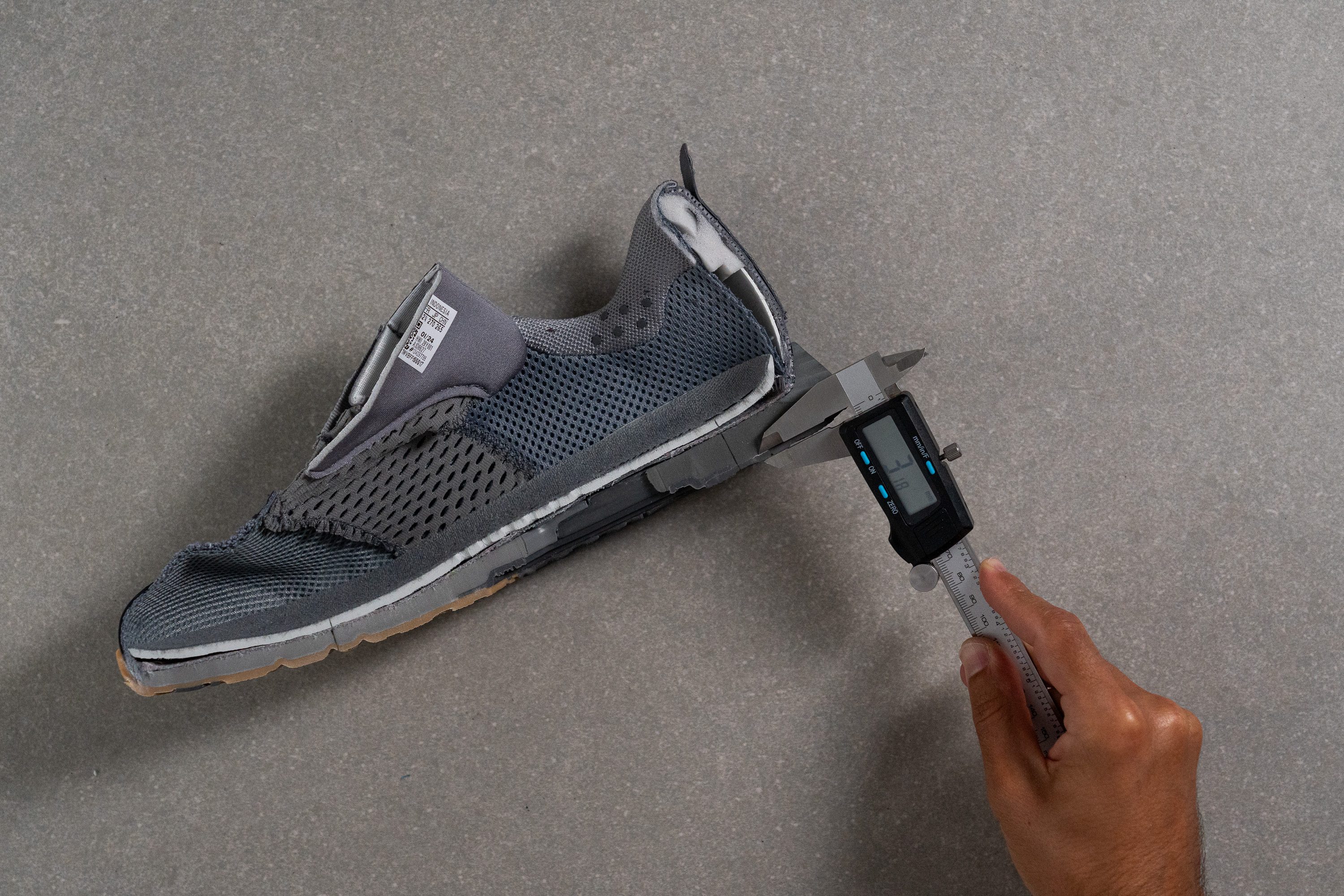
To sum it up, we can confirm that the Adidas Dropset 3 has a sturdy and lasting outsole that is sufficiently thick, hard, and wear-resistant.
| Dropset 3 | 3.2 mm |
| Average | 3.6 mm |
Misc
Insole thickness
The Dropset 3's insole showed a standard thickness of 3.7 mm on our calliper. It added a touch of padding that didn't mess with the shoe's stability.
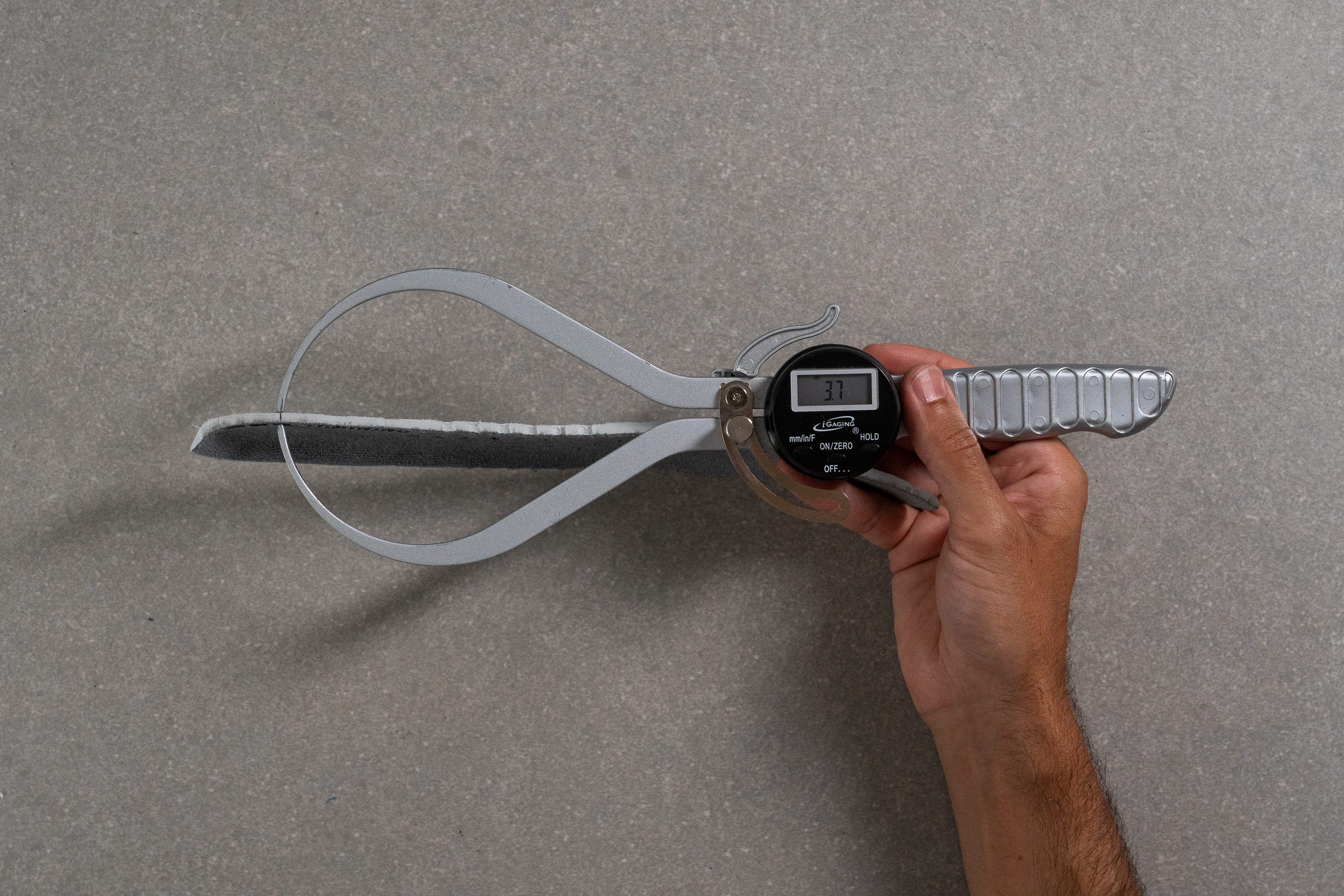
And if you are concerned about perforations - no need to worry! They are not felt through the sock.
| Dropset 3 | 3.7 mm |
| Average | 4.0 mm |
Removable insole
You can remove the insole from the Adidas Dropset 3 but keep in mind that its perforations are part of the shoe's HEAT.RDY technology. Replacing it will result in compromised ventilation.
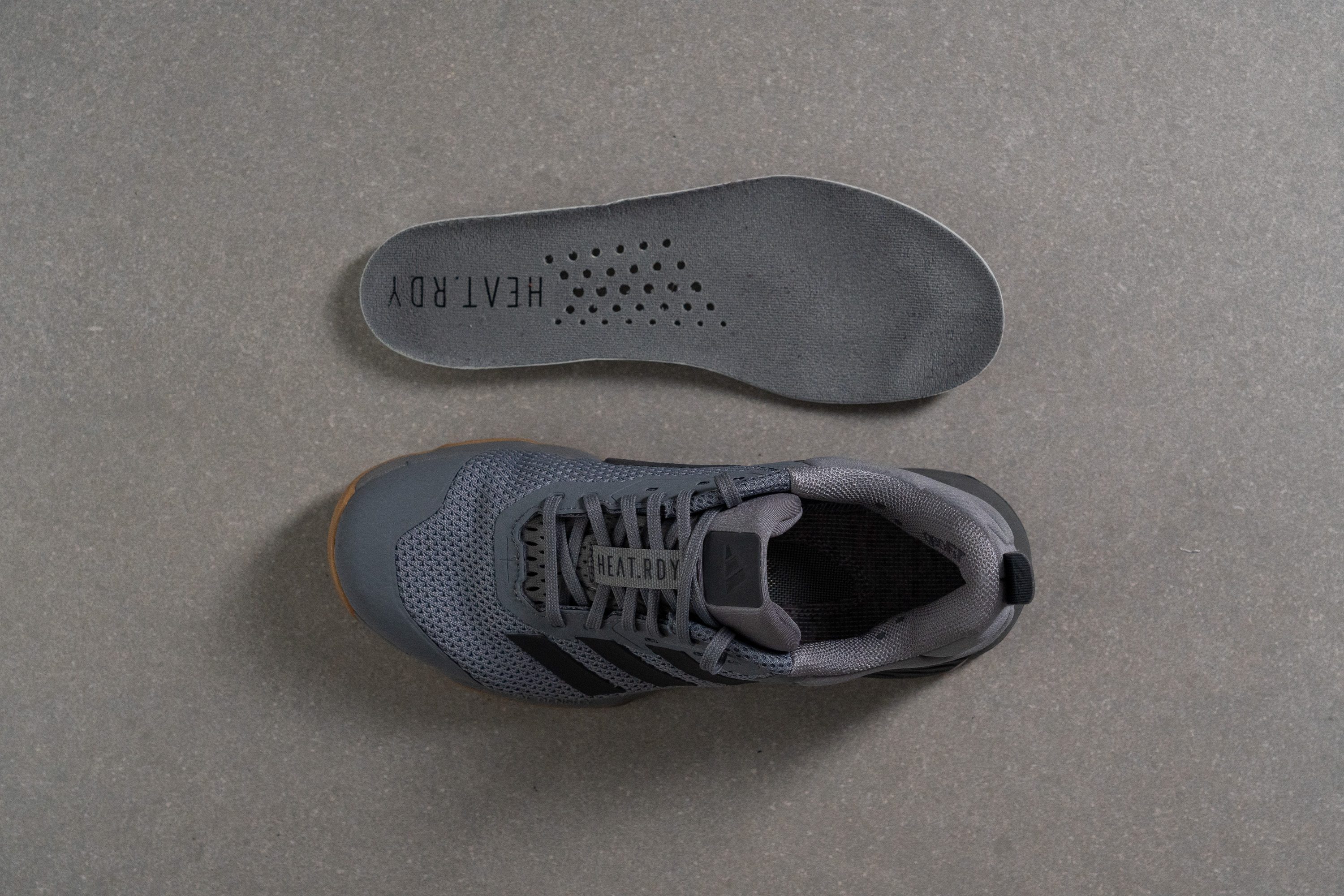
| Dropset 3 | Yes |
Tongue padding
Even if you cinch the laces down as tightly as possible, lace bites will not be a problem. There is a good amount of foam padding in the tongue to keep the lace pressure at bay.
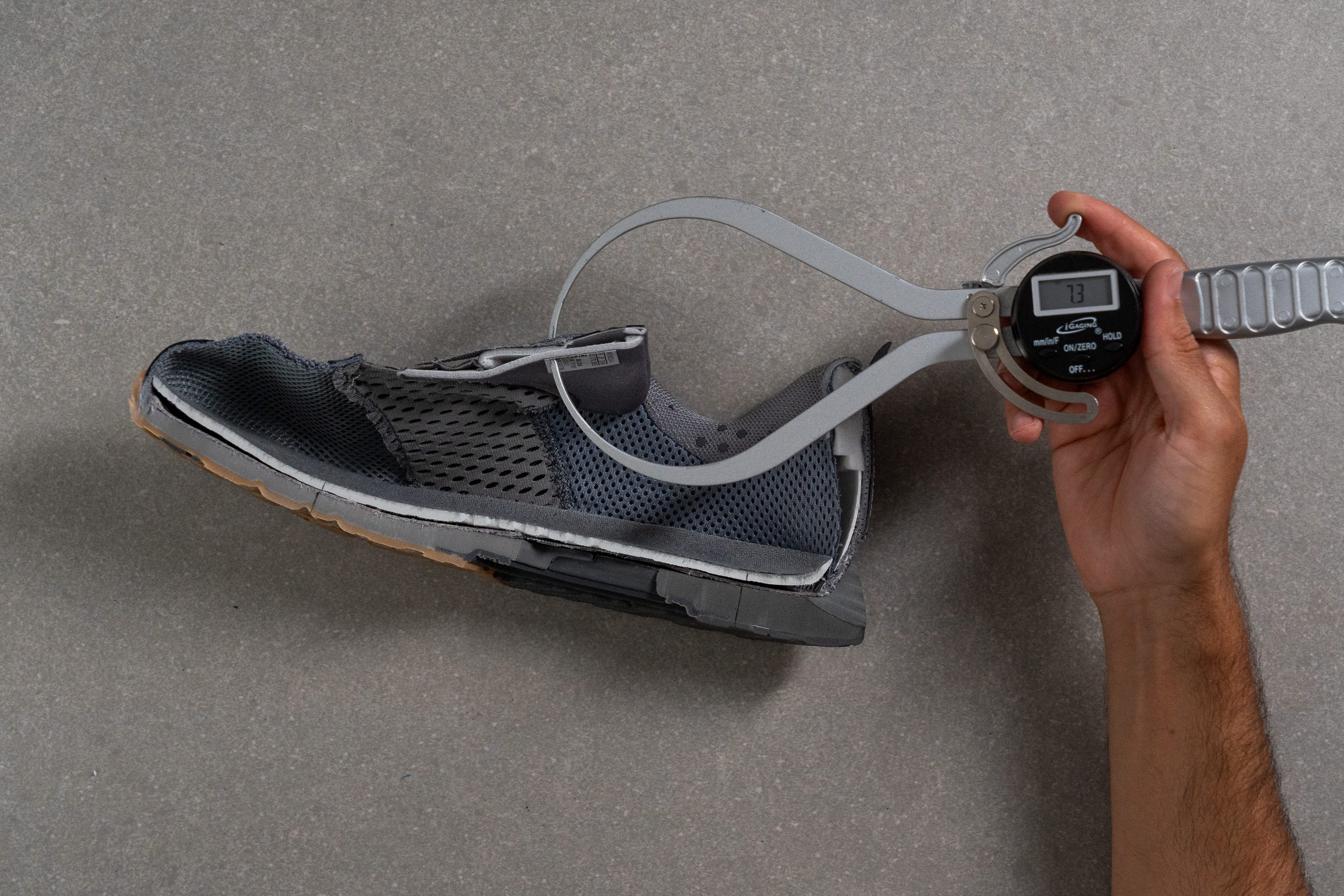
Our calliper measured 7.3 mm of tongue thickness in the Dropset 3 - 2.4 mm thinner than the tongue of the Dropset 2.
| Dropset 3 | 7.3 mm |
| Average | 5.7 mm |
Tongue: gusset type
The tongue of the Dropset 3 is fully attached to the shoe quarters on both sides (aka fully gusseted). This setup noticeably enhances the foothold and prevents the tongue from sliding to the side as you train.
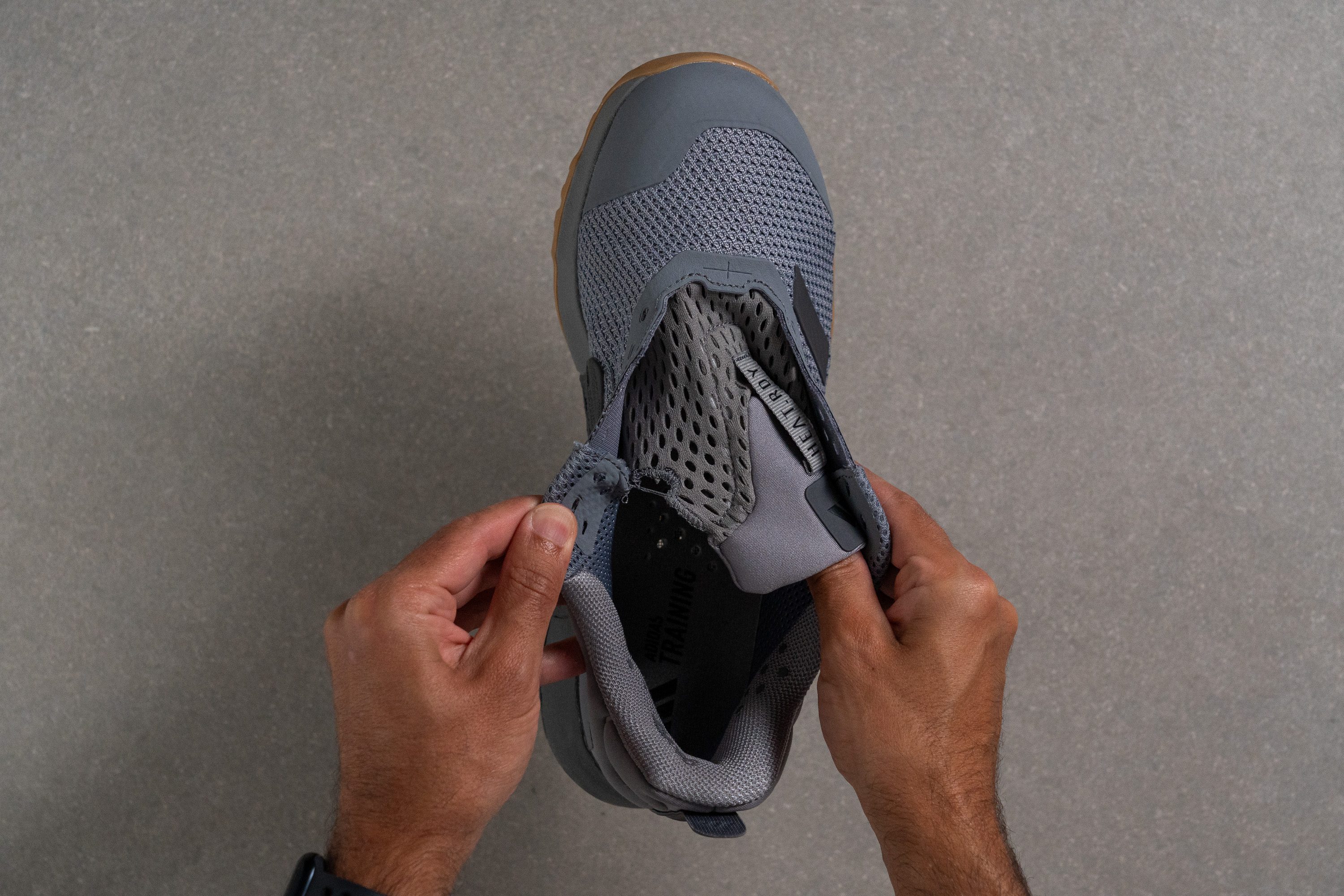
| Dropset 3 | Both sides (full) |
Heel tab
A large pull tab extends up at the back of the Dropset 3.
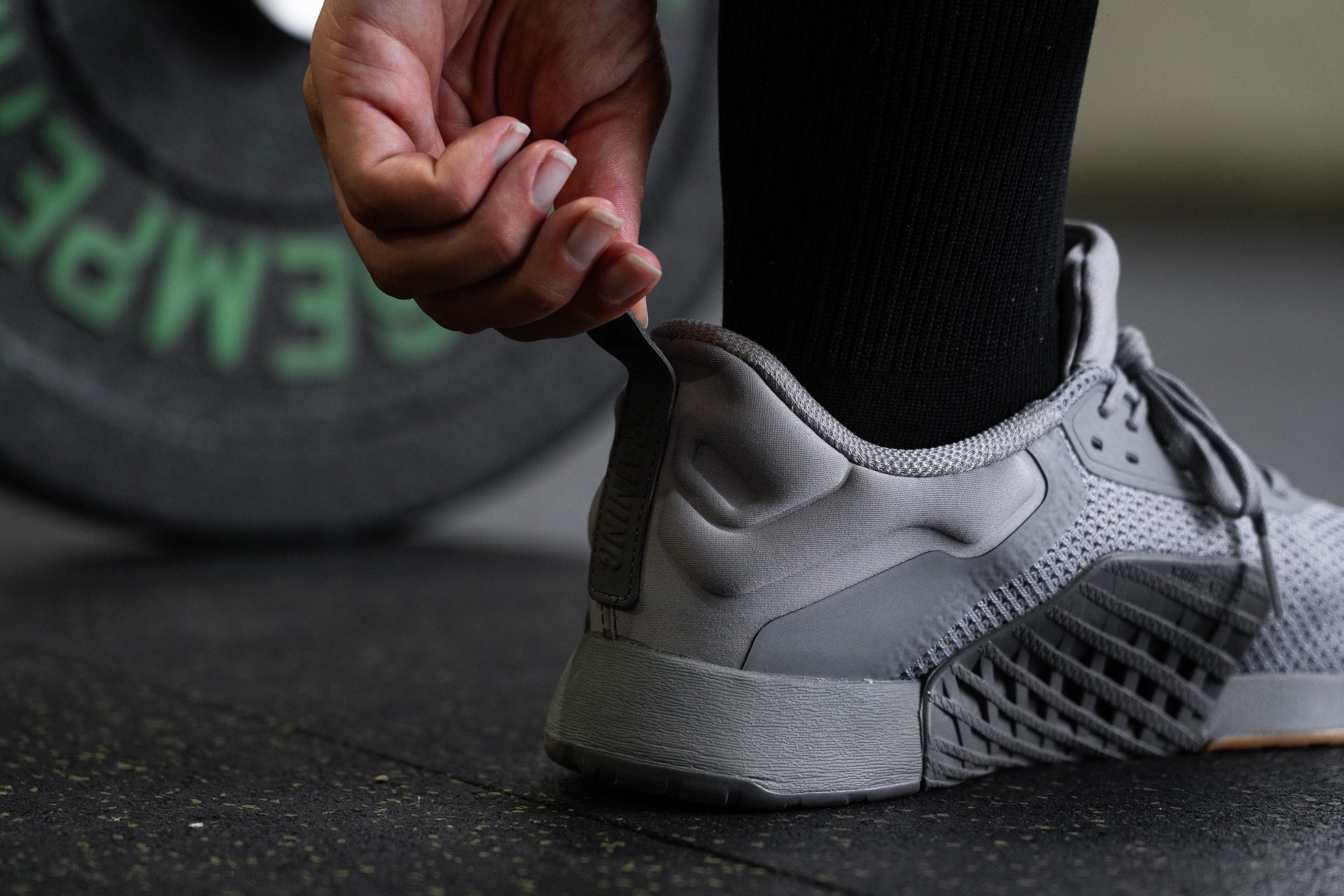
| Dropset 3 | Pull tab |
Sustainable materials
According to Adidas, at least 20% of the Dropset 3 are made of recycled materials. It doesn't seem like much but it is something compared to moth other trainers on the market.
